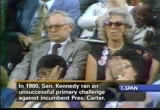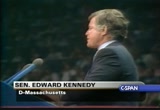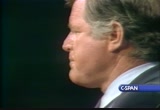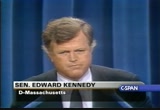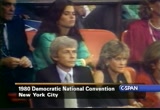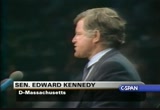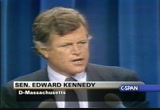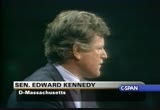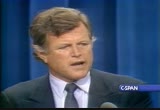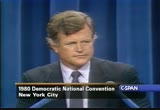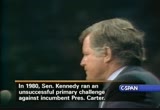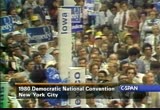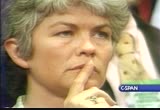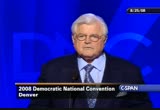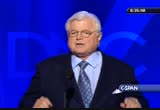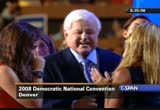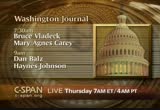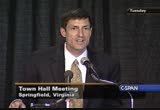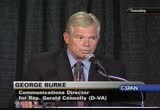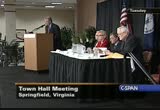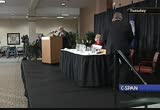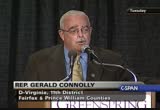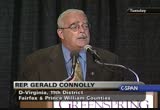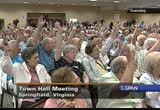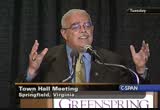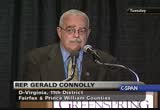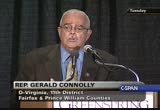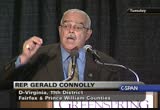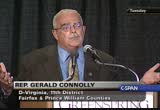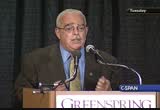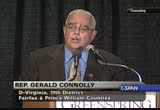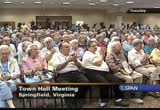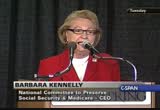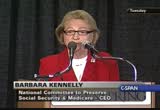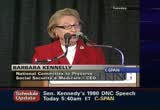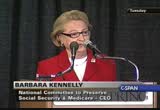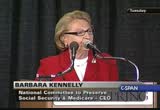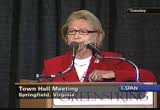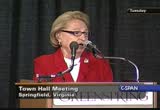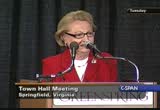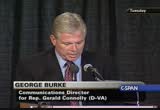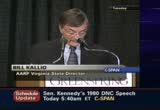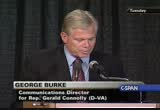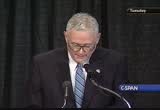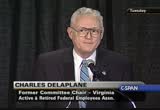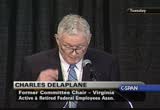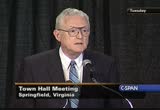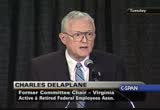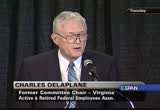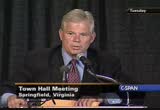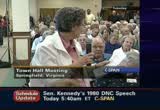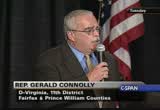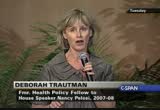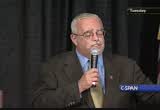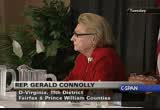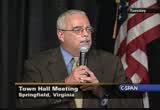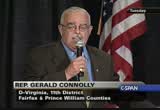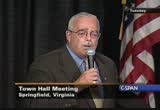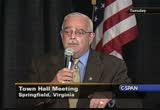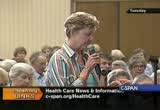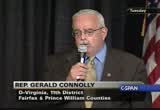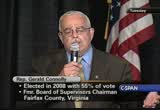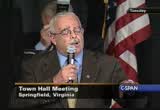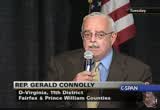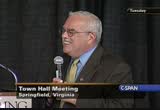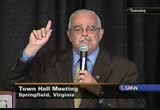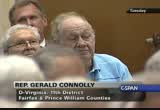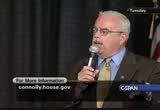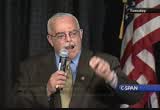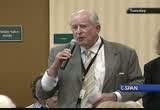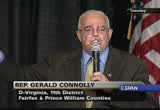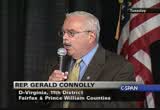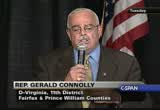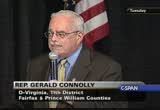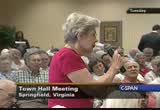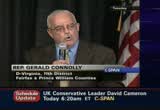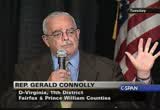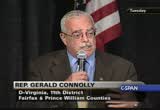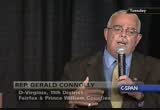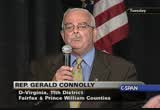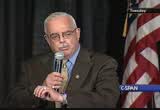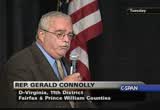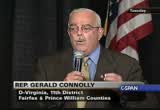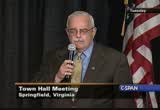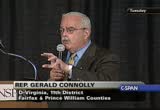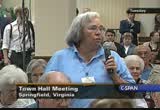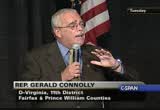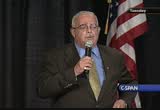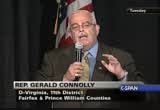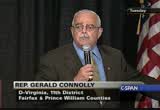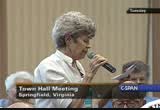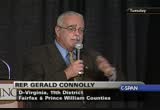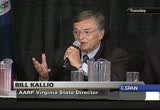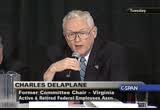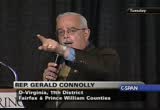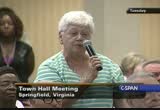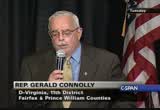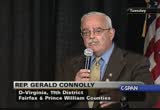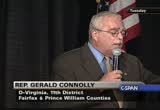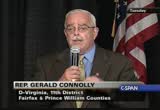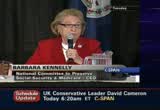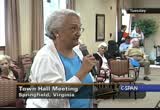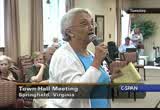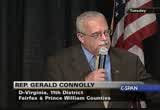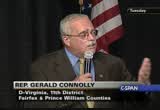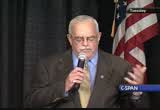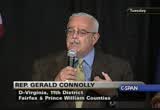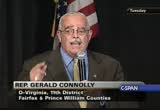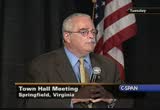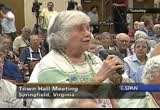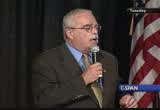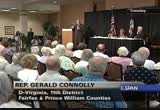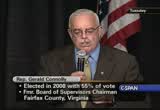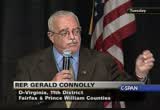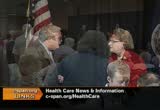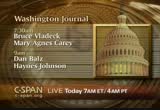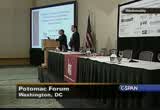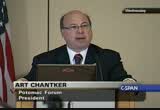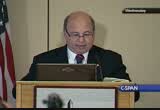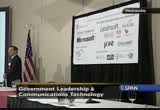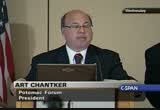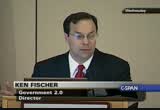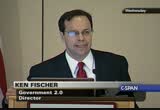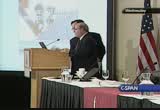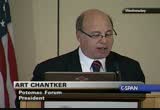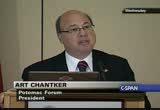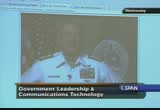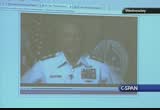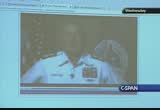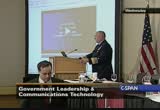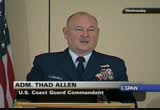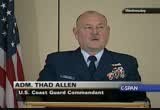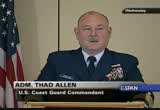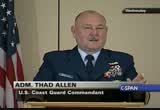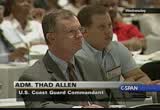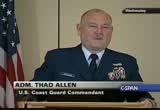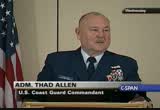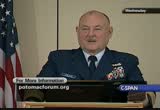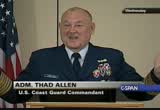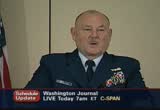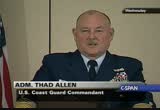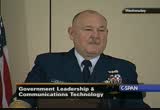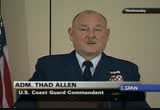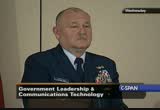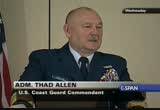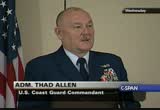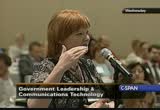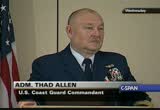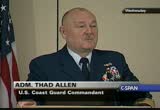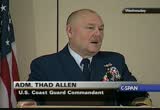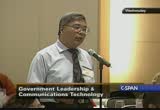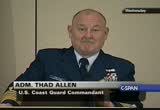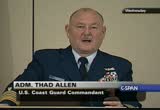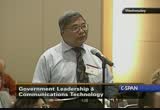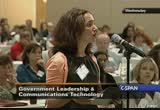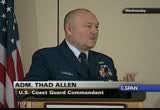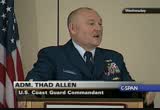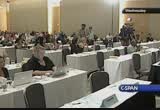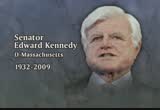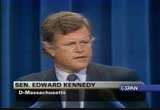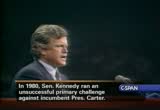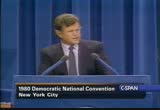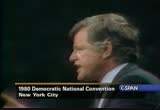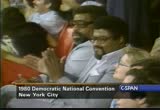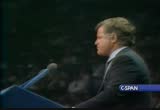tv Today in Washington CSPAN August 27, 2009 2:00am-6:00am EDT
2:00 am
2:01 am
across the generations. it is the glory and the greatness of our tradition to speak for those who have no voice, to remember those who are forgotten, to respond to the frustrations and fulfill the aspirations of all americans seeking a better life in a better land. we dare not forsake that tradition. we cannot let the great purposes of the democratic party become the bygone passages of history. we must not permit the republicans to seize and run on the slogans of prosperity. we heard the orators at their convention all trying to talk like democrats. they proved that even republican nominees can quote franklin
2:02 am
roosevelt to their own purpose. the grand old party thinks it has found a great new trick, but 40 years ago an earlier generation of republicans attempted the same trick. and franklin roosevelt himself replied, "most republican leaders have bitterly fought and blocked the forward surge of average men and women in their pursuit of happiness. let us not be deluded that overnight those leaders have suddenly become the friends of average men and women." "you know," he continued, "very few of us are that gullible."
2:03 am
and four years later when the republicans tried that trick again, franklin roosevelt asked "can the old guard pass itself off as the new deal? i think not. we have all seen many marvelous stunts in the circus, but no performing elephant could turn a handspring without falling flat on its back." the 1980 republican convention was awash with crocodile tears for our economic distress, but it is by their long record and
2:04 am
not their recent words that you shall know them. the same republicans who are talking about the crisis of unemployment have nominated a man who once said, and i quote, "unemployment insurance is a prepaid vacation plan for freeloaders." and that nominee is no friend of labor. the same republicans who are talking about the problems of the inner cities have nominated a man who said, and i quote, "i have included in my morning and evening prayers every day the prayer that the federal government not bail out new york." and that nominee is no friend of this city and our great urban centers across this nation.
2:05 am
the same republicans who are talking about security for the elderly have nominated a man who said just four years ago that "participation in social security should be made voluntary." and that nominee is no friend of the senior citizens of this nation. the same republicans who are talking about preserving the environment have nominated a man who last year made the preposterous statement, and i quote, "eighty percent of our air pollution comes from plants and trees."
2:06 am
and that nominee is no friend of the environment. and the same republicans who are invoking franklin roosevelt have nominated a man who said in 1976, and these are his exact words, "fascism was really the basis of the new deal." and that nominee whose name is ronald reagan has no right to quote franklin delano roosevelt.
2:07 am
the great adventures which our opponents offer is a voyage into the past. progress is our heritage, not theirs. what is right for us as democrats is also the right way for democrats to win. the commitment i seek is not to outworn views but to old values that will never wear out. programs may sometimes become obsolete, but the ideal of fairness always endures. circumstances may change, but the work of compassion must continue. it is surely correct that we cannot solve problems by throwing money at them, but it
2:08 am
is also correct that we dare not throw out our national problems onto a scrap heap of inattention and indifference. the poor may be out of political fashion, but they are not without human needs. the middle class may be angry, but they have not lost the dream that all americans can advance together. the demand of our people in 1980 is not for smaller government or bigger government but for better government. some say that government is always bad and that spending for basic social programs is the root of our economic evils. but we reply -- the present inflation and recession cost our economy $200 billion a year. e reply -- inflation and
2:09 am
unemployment are the biggest spenders of all. the task of leadership in 1980 is not to parade scapegoats or to seek refuge in reaction, but to match our power to the possibilities of progress. while others talked of free enterprise, it was the democratic party that acted and we ended excessive regulation in the airline and trucking industry and we restored competition to the marketplace. and i take some satisfaction that this deregulation was legislation that i sponsored and passed in the congress of the united states. as democrats we recognize that each generation of americans has a rendezvous with a different reality. the answers of one generation become the questions of the next generation.
2:10 am
but there is a guiding star in the american firmament. it is as old as the revolutionary belief that all people are created equal, and as clear as the contemporary condition of liberty city and the south bronx. again and again democratic leaders have followed that star and they have given new meaning to the old values of liberty and justice for all. we are the party. we are the party of the new freedom, the new deal and the new frontier. we have always been the party of hope. so this year let us offer new hope, new hope to an america uncertain about the present, but unsurpassed in its potential for the future. to all those who are idle in
2:11 am
the cities and industries of america let us provide new hope for the dignity of useful work. democrats have always believed that a basic civil right of all americans is their right to earn their own way. the party of the people must always be the party of full employment. to all those who doubt the future of our economy, let us provide new hope for the reindustrialization of america. and let our vision reach beyond the next election or the next year to a new generation of prosperity. if we could rebuild germany and japan after world war ii, then surely we can reindustrialize our own nation and revive our inner cities in the 1980s.
2:12 am
to all those who work hard for a living wage let us provide new hope that the price of their employment shall not be an unsafe workplace and a death at an earlier age. to all those who inhabit our land from california to the new york island, from the redwood forest to the gulfstream waters, let us provide new hope that prosperity shall not be purchased by poisoning the air, the rivers and the natural resources that are the greatest gift of this continent. we must insist that our
2:13 am
children and our grandchildren shall inherit a land which they can truly call america the beautiful. to all those who see the worth of their work and their savings taken by inflation, let us offer new hope for a stable economy. we must meet the pressures of the present by invoking the full power of government to master increasing prices. in candor, we must say that the federal budget can be balanced only by policies that bring us to a balanced prosperity of full employment and price restraint. and to all those overburdened by an unfair tax structure, let us provide new hope for real tax reform. instead of shutting down
2:14 am
classrooms, let us shut off tax shelters. instead of cutting out school lunches, let us cut off tax subsidies for expensive business lunches that are nothing more than food stamps for the rich. the tax cut of our republican opponents takes the name of tax reform in vain. it is a wonderfully republican idea that would redistribute income in the wrong direction. it is good news for any of you with incomes over $200,000 a year. for the few of you, it offers a pot of gold worth $14,000.
2:15 am
but the republican tax cut is bad news for the middle income families. for the many of you, they plan a pittance of $200 a year, and that is not what the democratic party means when we say tax reform. the vast majority of americans cannot afford this panacea from a republican nominee who has denounced the progressive income tax as the invention of karl marx. i am afraid he has confused karl marx with theodore roosevelt -- that obscure republican president who sought and fought for a tax system
2:16 am
based on ability to pay. theodore roosevelt was not karl marx, and the republican tax scheme is not tax reform. finally, we cannot have a fair prosperity in isolation from a fair society. so i will continue to stand for a national health insurance. we must not surrender to the relentless medical inflation that can bankrupt almost anyone and that may soon break the budgets of government at every level. let us insist on real control over what doctors and hospitals
2:17 am
can charge, and let us resolve that the state of a family's health shall never depend on the size of a family's wealth. the president, the vice president, the members of congress have a medical plan that meets their needs in full, and whenever senators and representatives catch a little cold, the capitol physician will see them immediately, treat them promptly, fill a prescription on the spot. we do not get a bill even if we ask for it, and when do you think was the last time a member of congress asked for a bill from the federal government? i say again, as i have before,
2:18 am
if health insurance is good enough for the president, the vice president and the congress of the united states, then it is good enough for you and every family in america. there were some who said we should be silent about our differences on issues during this convention, but the heritage of the democratic party has been a history of democracy. we fight hard because we care deeply about our principles and purposes. we did not flee this struggle.
2:19 am
we welcome the contrast with the empty and expedient spectacle last month in detroit where no nomination was contested, no question was debated, and no one dared to raise any doubt or dissent. democrats can be proud that we chose a different course and a different platform. we can be proud that our party stands for investment in safe energy instead of a nuclear future that may threaten the future itself. we must not permit the neighborhoods of america to be permanently shadowed by the fear of another three mile island. we can be proud that our party
2:20 am
stands for a fair housing law to unlock the doors of discrimination once and for all. the american house will be divided against itself so long as there is prejudice against any american buying or renting a home. and we can be proud that our party stands plainly and publicly and persistently for the ratification of the equal rights amendment. women hold their rightful place at our convention, and women must have their rightful place in the constitution of the united states. on this issue we will not yield, we will not equivocate,
2:21 am
we will not rationalize, explain or excuse. we will stand for e.r.a. and for the recognition at long last that our nation was made up of founding mothers as well as founding fathers. a fair prosperity and a just society are within our vision and our grasp, and we do not have every answer. there are questions not yet asked, waiting for us in the recesses of the future, but of this much we can be certain because it is the lesson of all our history -- together a president and the people can make a difference. i have found that faith still
2:22 am
alive wherever i have traveled across this land. so let us reject the counsel of retreat and the call to reaction. let us go forward in the knowledge that history only helps those who help themselves. there will be setbacks and sacrifices in the years ahead but i am convinced that we as a people are ready to give something back to our country in return for all it has given to us. let this be our commitment -- whatever sacrifices must be made will be shared and shared fairly. and let this be our confidence -- at the end of our journey and always before us shines that ideal of liberty and justice for all.
2:23 am
in closing, let me say a few words to all those that i have met and to all those who have supported me, at this convention and across the country. there were hard hours on our journey, and often we sailed against the wind. but always we kept our rudder true, and there were so many of you who stayed the course and shared our hope. you gave your help, but even more, you gave your hearts. because of you, this has been a happy campaign. you welcomed joan, me and our family into your homes and neighborhoods, your churches, your campuses, your union halls. when i think back of all the miles and all the months and all the memories, i think of you. i recall the poet's words, and i say -- what golden friends i
2:24 am
have. among you, my golden friends across this land, i have listened and learned. i have listened to kenny dubois, a glassblower in charleston, west virginia, who has ten children to support but has lost his job after 35 years, just three years short of qualifying for his pension. i have listened to the trachta family who farm in iowa and who wonder whether they can pass the good life and the good earth on to their children. i have listened to the grandmother in east oakland who no longer has a phone to call her grandchildren because she gave it up to pay the rent on her small apartment. i have listened to young workers out of work, to students without the tuition for college, and to families without the chance to own a home. i have seen the closed
2:25 am
factories and the stalled assembly lines of anderson, indiana and south gate, california, and i have seen too many, far too many idle men and women desperate to work. i have seen too many, far too many working families desperate to protect the value of their wages from the ravages of inflation. yet i have also sensed a yearning for new hope among the people in every state where i have been. and i have felt it in their handshakes, i saw it in their faces, and i shall never forget the mothers who carried children to our rallies. i shall always remember the elderly who have lived in an america of high purpose and who believe that it can all happen again. tonight, in their name, i have come here to speak for them. and for their sake, i ask you to stand with them. on their behalf i ask you to restate and reaffirm the timeless truth of our party. i congratulate president carter on his victory here.
2:26 am
i am confident that the democratic party will reunite on the basis of democratic principles, and that together we will march towards a democratic victory in 1980. and someday, long after this convention, long after the signs come down, and the crowds stop cheering, and the bands stop playing, may it be said of our campaign that we kept the
2:27 am
faith. may it be said of our party in 1980 that we found our faith again. and may it be said of us, both in dark passages and in bright days, in the words of tennyson that my brothers quoted and loved, and that have special meaning for me now -- "i am a part of all that i have met. tho much is taken, much abides. that which we are, we are -- one equal temper of heroic hearts, strong in will to strive, to seek, to find, and not to yield." for me, a few hours ago, this campaign came to an end. for all those whose cares have been our concern, the work goes on, the cause endures, the hope still lives, and the dream shall never die.
2:28 am
2:29 am
2:30 am
thank you. thank you, thank you, caroline. my fellow democrats, my fellow americans, is so wonderful to be here. [applause] and nothing is going to keep me away from this special gathering tonight. [applause] i have come here tonight to stand with you, to change america, to restore its future, to rise to our best ideals, and to elect barack obama, president
2:31 am
of the united states. [applause] as i look ahead, i am strengthen by family and friendship. so many of you have been with me in the happiest days and the hardest days. together, we have known success and seen setbacks, victory and defeat, but we have never lost our belief that we are all called to a better country and a newark world's -- newer world, and i pledge to you will be there next january on the floor of the united states senate. [applause]
2:32 am
>thank you. for me, this is a season of hope, new hope for a justice and prosperity, for the many, not just a few. new hope, and this is because of my life. new hope that we will break -- this is in the cause of my life. you hope will break the gridlock, and every american, north, south, east, west, young, old, will have decent quality
2:33 am
health care as a fundamental right and not a privilege. [applause] we can meet these challenges with barack obama. yes, we can, and finally, yes, we will. [applause] barack obama will close the book on the old politics of race, agenda, and group against group, and straight against hgay. [applause] and barack obama will be a commander in chief who
2:34 am
understands that young americans in uniform must never be committed to a mistake, but always to something worthy of their bravery he. [applause] we are told that barack obama believes too much in an america of high principle and boulder and denver, but when john kennedy -- and boulder and denver -- bold endeavor, but when john kennedy wanted to go to the moon, he did not say it is too hard. we will not try. he rose to the challenge. today an american flag still
2:35 am
parks the surface of the moon. [applause] yes, we are all americans. this is what we do. we reached the moon. we scale the heights. i know it. i have seen it. i have lived it, and we can do it again. [applause] there is a new wave of change all around us, and if we set our compass through, we will reach our destination, not merely a victory for our party, but a renewal for our nation, and this november, the torch will be passed again to a new generation of americans, so with barack
2:36 am
2:38 am
2:39 am
springfield va. a pentagon official talks of how government agencies are using internet social media like blondes and facebook -- b social media -- blogs and facebook. >> on tomorrow morning, a look at medicare part "b" with the head of the finance and administration. we will look back at the 2008 presidential race with dan bal z and haynes johnson. watch it each morning beginning at 7:00 a.m. eastern time. >> in 1959, in the heat of the cold war, a soviet man took an unprecedented two week tour of
2:40 am
the u.s. but no he recounts that trip -- u.s. he recounts that trip. >> now healthcare town hall meeting with virginia democrat gerry connolly. he is a freshman congressman representing the state's 11 districts. he met with constituents at a senior center in springfield, va. this is just over two hours. >> i d >> i do want to welcome everybody here today. i certainly want to welcome congressman connolly. this is a very exciting time. we find ourselves as the community right in the middle of some of these discussions. part of the political process
2:41 am
-- it is an exciting place to be. i have no doubt that today will be a model for how to have one of these discussions and have a town hall meeting. others will try to duplicate our process of civility and courtesy to each other as we do this today. we are going to have some great presentations. at the end we will have plenty of time for questions and answers. we will have a microphone if you would like to ask a question. do ask that to keep your questions to 30 seconds. we want to have time for everybody. i want to introduce george burke. >> what a crowd.
2:42 am
the health care reform is an important issue that affects every american. we know it is particularly important to all you gathered here today. there are a lot of missed being circulated. there are also legitimate concerns. we want to try to address your concerns today and your questions. we thank all of you who chose to come here today. we apologize to those who cannot get into too physical limitations. as the open, congressman connolly will deliver brief remarks. then i will hand over the microphone to the congressman. we will field your questions for the 1.5 to two hours. there are two microphones. if you prefer to be seated, steve elliott will have a roving microphone. please, raise your hand. we hope you will limit your
2:43 am
questions to 30 seconds so that as many residents as possible have the opportunity to ask questions. well we understand it we have guests here in the room today, we would ask that you refrain from asking any questions of the panel and an least hold those questions until virtually everybody has an opportunity to ask the theirs. we think it is important. we want to make sure that you have the opportunity to ask your congressmen and these panelists the questions. that would be greatly appreciated. if your question is not answered, there will be in-depth cards that will be passed out.
2:44 am
you can ask the question on there and send it in if you are not able to ask here. i hope we get through them all. looking at this room, that may be tough. it is my pleasure to introduce someone than most of you already know. during his 14 year career as a member of the fairfax board of supervisors, the last five as chairman of the board of washington's largest jurisdiction, mr. connolly championed an aggressive agenda that earns fairfax county the moniker of best managed large county in the nation. i do not know of many of you know that the bill he has a long record of achievement on many issues, including issues affecting seniors. since taking office in january, he has already earned the reputation as an expert on state and local government issues and on budget issues.
2:45 am
he was recently recognized by a national magazine for his work on issues concerning the federal work force. recently he was elected president of the freshman class in congress. without further ado, i give you congressman gerry connolly. >> thank you. thank you very much. i am irish, and i cannot resist telling a story. resist telling a story. mrs. murphy was driving around and driving too fast in a residential zone. she stopped by a very young police officer three weeks of the academy. he stopped her in said, you are going 50 miles an hour and a 25 mile an hour zone. what you have to say for yourself? she looked up at him with those eyes and said, i do not have a license.
2:46 am
she said it was a stolen vehicle. he said, alecky to open the trunk. she said there is a dead body in there. he was flustered. the sergeant said he needed to see her license. she says, no problem. here it is. she gives them the license. he said, what about the registration. she handed to him. she opened the trunk and it was clean as a whistle. he said, i do not understand. he told my officer you did not have a license, the car was stolen, and there is a body in the trunk. she looked up at him and said, i think he said i was speeding, too. the irish are always thinking. thank you for giving us such a warm welcome i am a familiar
2:47 am
face. i have been coming here for the last eight or nine years. a few things i want to tell you about in terms of health care. you need to know that your congressman has not endorsed any bill. i have not said i liked this bill or that bill. in fact, i have raised some concerns about some provisions in the major draft in the house. there are three bills that need to be reconciled in the house. we do not yet have a final draft. the working draft we are all working out is this one. if you want to know, if i read the bill, i just have read a lot. i have read hundreds of articles. i have gone through lots of
2:48 am
briefings. i am trying to make sure i'm educated in health care and the we are looking at all the right issues. i have some current about the funding and the nature of coverage. i have some concerns about some of the reforms. when i look at reform, but me share with you what i start with and maybe you do too. while a lot of this like the coverage we have now -- and by the way, how many have medicare? i know that the republicans know that is a federal program. a lot of us have medicare. i just talked to my dad. he said i had been using medicare for 17 years. him and my mother or in frail health. he said that i want you to know,
2:49 am
in the 17 years of being a consumer of medicare, not once have they made a mistake but do not want said they failed to make the payments that they needed to make. that was important the back to get from my dad. -- feedback to get from my dad. if you did get the economics of health care, we are in trouble. it is costing too much. in the united states, we spend $7,000 per person per year on health care. that is twice the median of all the other industrialized countries. we are paying twice what they are paying the we are not spending -- in 1960, we spend 5% of our gdp on health care. today we are spending 18%. if we do nothing by the time i am 100, we will be spending 48%,
2:50 am
almost half of our economy on health care. that is not sustainable. you have not -- you have even seen it in medicare payments in terms of premiums. they are going up about 10% a year. it is taking a bigger bite out of our seniors. deductibles and the last 10 years have doubled. premiums have doubled. copayments have doubled. insurance company profits have gone up 428%. i want to look at three things. there are a lot of particulars. i want to make sure that the 47 million americans without health care coverage. we are concerned about it because they represent a pact between you and me. what healthcare do they resulted they do not have coverage? they go to the emergency room.
2:51 am
uncompensated care in america costs $43 billion. you and i pay that. we paid in higher premiums and billing. i want to address the 47 million and that do not have health care coverage to bring them into the system. if that can help lower costs by having risk pool. i want to have a meaningful basket of health care reform. let's start with medicare. i want to close the doughnut hole on prescription drugs. i want to make sure all of our seniors have access to the medications they need and that nobody in america over 55 or 65 have to make a terrible decision of buying the mill or drugs. there are some judge -- drugs that cost a lot of money. i want to make catastrophic illness does not bankrupt families. in our district along, last
2:52 am
year, 1430 families filed for bankruptcy because of health care costs. any family in america, young or old, could be one accident away from catastrophic health-care costs. capping costs so that no family is forced to be in a position i think is an important reform. portability. that is important. preventing insurers from cherry picking for pre-existing conditions. you and i are of a certain age. a lot of my staff are in their 20s. what i say to them is if you are lucky enough, everybody in american will have a pre- existing condition, because as we get old, we develop conditions. some of them are more serious than others.
2:53 am
45% of all insured americans have a previous existing condition. my wife is a diabetic. she developed because of an asthma attack. she now index a drug several times a day. it costs a lot of money to maintain her health. as she gets older, it will get more aggravated. we care a lot about this. millions of american families face the same thing. all too frequently, insurers have actually exercise rationing of health care by denying health care. we need a reform that will and end that. they can afford it. their profits have gone up 428%. the third thing i want to see is that over time we get control of
2:54 am
the long-term health care curve so that the cost to the economy, to the government, and to families comes down. if health care is more affordable with businesses, and let me give an example -- the cost of doing nothing is that these costs continue to rise and more and more americans cannot access the health care they need. let's take small businesses. maybe most of the people in this room are not running one. you may know someone who is or maybe you ran one. 60% of small businesses just 10 years ago provided health care coverage to their employees. today is only 55%. 45% do not provide health care. if we do nothing, it the cost of small business over the next 10- years will get up to $2.40 trillion. we are going to have probably 35% of small businesses providing health-care coverage to their employees if we do
2:55 am
nothing. i want to make sure that whatever we are talking about, do those three things. let me make one fact. i will not vote for any health- care bill that in any way does any harm to medicare. i think that is an important principle. i want to vote for one that increase medicare by closing at a doughnut hole on prescription drugs and that allows us to pursue preventive health care. the draft a bill here would eliminate the co-payments for people who go in to see the doctor for preventive care. i think it is a good reform. the more we can focus on preventive care, the more we can get savings in the long run. i have an open mind. i'm here today to share with you and to also listen to you. i know where when to do that in
2:56 am
a civil and respectful way. we always do that here. when we are finished, hopefully, the residents will show the rest of america have a town meeting ought to be held. vigorous debate, strongly held views, listening respectfully, and sharing civilly and respectfully with one another. thank you so much for having me here today. [applause] >> it is my privilege to introduce a barber. she is the president and chief executive officer of the national committee to preserve social security and medicare. she has been 25 years in public service at the local state and federal levels, including 17 years as a member of congress. she is a former ranking member of the house ways and means
2:57 am
committee subcommittee on social security. issues the first woman to serve as chief majority in the house of representatives. she is also the first woman to serve on the house committee on intelligence. she has advocated for social security, medicare, and other health and retirement issues. it is one of the reasons why we have heard here with us today. after leaving congress, she served as consulate to the commissioner of the social security administration. she served on the 2006 white house conference on aging. she was appointed to the social security advisor for. i would suggest that she knows her stuff. let me give you barbara kennelly. thank you very much. >> thank you very much. talking but knowing your step.
2:58 am
here congressmen certainly knows his stuff. i have been at a number of town hall meetings. to hear him go through that bill is music to my ears. i am here as the president of a [unintelligible] we have 4 mlion members in support. they come from all walks of life. the one common thing they have is their absolute passion about social security and medicare. before i get into medicare, i want to mention that some of you remember a few years ago when our president bush decided he wanted to privatize this. it was not a good idea. i went around the country talking to our members. i would have audiences similar to this one. they knew their social security was not going to be affected. they might have a doctor -- a
2:59 am
doctor with three children, and they knew that drdaughter would need social security. now have people saying to me all the time, you do not have to worry about social security. privatization is dead. we do have to worry about social security. the reason we do is the deficit that we have in this country and the people that were against social security in 1935 are the same people who work for privatization and vote now they are saying that with this deficit we cannot afford social security. that is absolutely not the truth. it is not so secure the the cause the deficit. we all pay into that every single paycheck. amigo to medicare.
3:00 am
-- let me go to medicare. it has been one of the most it continues for health care. we have to limit medicare use the same doctors and facilities -- we have to remember that medicare uses the same doctors and facilities burd. it cannot hold the tide of inflation. if any health care reform bill strengthens medicare and does not weaken it. my group, we have not taking a position on health care reform. to let one's health care reform? of course i do. the three bills,
3:01 am
they were all different. they have to go to the rules committee. that is the procedure. they have to be melded together. then they have to vote on the floor of the house. senator kennedy's health committee, they have a bill i love. i just love it but it is very expensive but talk about the finance committee. -- but it is very expensive. as talk about the finance committee. they do not tell us what they are doing i cannot endorse that bill. we do not know what the bill is going to look like. the house bill that is voted on in the floor, then it goes to congress. in 2003 we had the medicare act or you have part d, that went to
3:02 am
congress -- i read the bill. a schematic congress and i did not recognize it. -- when it came out of congress, i did not recognize it. for the last 25 years, we have been taxing medicare fighting against costs. we are not one to stop now. -- going to stop now. here is what i'm trying to say. i know there are those that think seniors and retired people do not seek health care reform. i promise you if we do not do health care in conjunction with a greater situation, down , the only place you'll be able to cut inflation -- the only place the government has control over is medicare. my message to you today is do
3:03 am
not be against any reform. if we do not do this, we will be out on a limb. the college entitlement reform. -- they call it entitlement reform. that will start in the budget office. am i glad this commerce men belonged to the budget committee. he understands how important medicare is. he also understands -- we act like our system is the most generous one. the average social security check per year is $13,800 but . let's try not to cut that too much. let's talk about the $500 billion that we read about. some of the five under billion
3:04 am
dollars is really going to help many predict-billion dollars is really going to help medicare. [unintelligible] you know well that it 21% cut from medicare, any doctor will look at the private group and not on medicare prepared that is . that is why we have to be careful about what we are doing. the good news about the doughnut hole [unintelligible] the bad news is that it takes 14 years to close it. the drug companies have put on the table $80 billion, saying we will get 60% for name brand when you are in the doughnut hole. obviously, the army -- making an
3:05 am
awful lot of money. we have to look at closing the doughnut hole. it is so hard to get out of it. it eliminates co-payments for preventive care. that is a very healthy thing to do. it improves benefits for lower income people. is it perfect? of course it is not. we thought very hard to have annual out-of-pocket expenses capped. i do not see why we do not know more about their ears, eyes, teeth. will we get older, we need some help. -- when we get older, we need some help. my message to you is not to close the door on health care reform. medicare will be left out there hanging. you are looking at a woman
3:06 am
worked stunning. -- studying. it was a complicated bill. they waited too long to show it to congress. congress was upset because they did not see it. the insurance companies hated it. i've represented hartford, connecticut it was the insurance capital of the world. before 1965, they would not touch anybody 65 and older. if you are older 65, you have more claims. when medicare was passed, all those over 65 for put in a pool -- or put in a pool so there was risk sharing. that is why it has worked.
3:07 am
our insurance companies happy? of course not. they know this time the inflation for health care insurance has gone so high that it is impossible. i stand here as a woman who voted for the bill. i could see what was coming. i could see inflation and health care is going to break people. the insurance companies never forgave me. let's stick with healthcare. i was a politician for years. [inaudible] i understand why the opposing party is having a problem with this bill. they were in control for 10 years -- eight years.
3:08 am
down the road, we need health care reform. everyone to keep medicare strong, we need a good bill and this congressmen will help us do that. [applause] >> thank you. he has served as state director for virginia since 1995. in that capacity, he oversees aarp's programs and advocacy activities. he has been with aarp for more than 21 years ago he first served as a senior program specialist. he directed their national would no persons service. later he served as legislative riverses did where he organized their federal -- legislative
3:09 am
committee where he organized their federal program. >> thank you for inviting us here today. thank you all for coming to the meeting. i usually stuck with an opening that will not work in this crowd. i can say to people, for those of you who have not noticed, there is a major demographic shift going on in the commonwealth of virginia, the old is getting older. it is true. today 14% of the population in virginia is 65 and older. by 2020, that will change to about 20%. by 2030, virginia retirement population will look much like
3:10 am
florida's looks like today. things are changing. that means the things we do today will probably not be the same the way we -- will not be the way we look at the future. well virginians have saved enough money to leave the extra 20 or 30 years? -- live the extra 20 or 30 years? how are we going to stretch the health care dollars? how are we going to develop the work force we need to develop all that health care? what about our communities, are they livable? how are we going to deliver those services to those boomers who have their own way of doing everything? these some of these questions as we are addressing today. a few years ago as we were looking at this, we try to focus on what the major issues are the
3:11 am
we need to think about today to prepare for the future. a few issues emerge from a unique campaign. this two issues were lifelong health and financial security. i want to take a little bit of time on this. i know you are here to talk about health. we know that retirement security -- you have social security. you have pensions if you are likely -- lucky enough and then you had your savings and investment. each one of these get wobbly over the years. many believe now that work might be the only alternative. the savings is at an all-time low. investments are declining in value. social security will become much more important for future retirees, even more than it is today.
3:12 am
in virginia, over 1,161,000 citizens seek social security benefits. you are not the only people. half of those rely on social security for at least half if not more than half of their income. one out of four rely on social security for all of their retirement. we need to get that going again. with this program, it to be much important -- much more important for the future. we need to make sure it can deliver 100% that it promises. we know that our health care system needs improvement. in a a r p's view it cost too much and lead to many people out. -- and leaves too many people
3:13 am
out. well you and other citizens are the only people in american society that have access universal health coverage, is the problem all over there really threaten the financial stability and viability of medicare. aarp is committed to working for comprehensive health-care reform in a way that increase medicare, expand access to the 46 million americans who have no health insurance, slows down runaway medical costs, and improves the quality we receive no matter where you are in the system. that is a pretty tall order. it is certainly not one to be is to. there is certainly no silver bullet to solve the problem. we believe that if we all work together and if congress can move the not partisanship, we
3:14 am
can find meaningful solutions that are good for every generation in society. we are in the middle of the debate right now. there have been some very strong opinions. the citizens are engaged. that is good. hopefully, congress will pass legislation that moves as in the right direction. we have got to get this job done. the cost of doing nothing is way too high. aarp has not endorsed any of the bills. we are very much for other individuals are here. we are looking at things we would like to see in health care reform. the final bill that we might indoors, it will pauley had the best things in there. -- that we might improve, it will have the best things in there. there are still some who do not want to see any changes to our
3:15 am
3:16 am
it will better protect access to the doctor of their choice, which is being limited right now. it will reduce the cost of preventive services so you can stay healthy and save money by providing new services that reduce unnecessary remissions. health care reform will strengthen the financial status of the entire program. what about the cannot afford health care reform? both the president and congress are committed to reducing legislation that will be paid for. it will not settle our children and grandchildren with unnecessary debt. it can be done if we do it right. we have to hold the president and congress accountable to answer that question.
3:17 am
do not forget that as research for that answer, the cost of doing nothing is also a really high. if we do nothing to fix healthcare, families of medicare and employer based coverage, will likely see their previous year the double again in the next seven years. a greater share of their take- home pay goes to pay for health care every year and it grows at a rate that outdoes inflation. we have to make real changes to slow down the rate of growth. we cannot afford not to reform health care. health care reform means rationing. this one has been kicking around for a while. none of the health proposals that we have seen would stand between individuals and their doctors or prevent americans
3:18 am
from choosing the best possible care. let me emphasize this. healthcare reform will not give the government the power to make life and death decisions regardless of the person's age. those decisions and every bill we have looked at will still be made by the individual, their doctor, and their family. health care reform will inch your that medicare doctors are paid fairly -- will ensure that medicare doctors are paid fairly. health care reform is not about rationing. is about giving people the piece of ninth -- peace of mind that they cawill not be discriminated against because of your age or your pre-existing condition. it is about introducing more choice and competition so that consumers can use their power to better control costs and get
3:19 am
more, not less, health care. there are several difficult choices that need to be made. we need to consider how to do those best. we do not need to get the verdict on misinformation that will take this away from the real issues. i hope we will be discussing those issues today. when one out of three americans have someone in their family that is getting cut back on medical care due to costs, when the number of the uninsured and purchase 50 million, and when employers struggle to pay for the cost of healthcare, the fact is we cannot afford not to fix the system. aarp pledges to cut to the noise to find the facts about the health care reform. i hope you'll join us.
3:20 am
this is probably the most american dialogue the we have had a long time. if we were together in a bipartisan way, together i think we can make it better. thank you. >> he is the former national legislative chair for the virginia federation of chapters of narf. he has worked for many years for the department of agriculture, including with the foreign agricultural service. he joins narf in august 1995 and has served as national legislative chair and as national legislative chair for narf's statewide virginia
3:21 am
federation. he also chaired the legislative committee for narf's last two national conventions. [applause] >> thank you. narf has a laundry list of issues will apart from health care. you'll find them outlined in his brochure that is on the table in the back. i was wondering how much i would be boring if i went through some of them. they had the instinct to call and say do not talk about there. talk about healthcare. that is what we will stick with intel arfe -- stick with and how
3:22 am
arfe the views health care. who in here remember -- who in here is a member ofarfe? how many in here are federal retirees? a much larger percentage. let me say we do not have a current position on health care reform, because there is no specific legislation that we have provision on. you have seen the phone book that congressman connolly wave at you. i assume the health committee bill is approximately the same size. i hear the senate finance bill when there is one will be smaller and more streamlined.
3:23 am
as yet, we do not have that in the senate. our health care attitude primarily is that it is not going to affect us terribly much in terms of the current bills that we have seen. most federal retirees can take their health insurance plans with them and after they turn 65, they combine them with medicare and medicaid. the health care reform measures have a very little effect on it. there are a good many issues that we have some attitudes toward. we support a premium conversion, which is a benefit for federal employees, which allows them to pay for the health insurance
3:24 am
3:25 am
we favor expanding medicaid eligibility but the problem is how he is going to get paid for. we favor a portability credit for retirees which are included in house bill, and increasing the age cutoff for coverage of dependent children to 26 and in our last convention, we have a recommendation to get the age cutoff raise to 25. we were happy to see it at 26 in the senate help build. -- help bill. this is currently not part of any of the three bills, but is
3:26 am
has certainly been talked about and in the senate finance committee. it is a cloud on the horizon that we are watching. we are concerned about opening the federal employees' health insurance benefits program to nonfederal civilians. this is another measure that has not been included in any measure yet. it has been talked about for the last few years. narfe's position is that we would not oppose that its separate risk pools were maintained. we are -- we're concerned about the effect of the reform on employers and insurance carriers. required benefit packages could affect their ability to ensure competition and offer choices such as we now have under the federal employees health benefits program.
3:27 am
as far as enhancing long-term care insurance, we do not see that a house and senate help committee bills do much at all for the current proposals. the prospects of slowing the growth of medicare and medicaid payments for providers worries us a bit, because i believe it was the congresswoman who mentioned the fact that if you cut back on provider payments, providers will back out of medicare and medicaid programs. that is a short summary of our non-position on health care reform. i will wrap it up and weaken open questions. -- and we can open questions. [applause] >> thank you, charles. i am going hand this meeting
3:28 am
over to the guy you really want to talk to, congressman connolly. i will come back at the end when we have to cut it off and leave this room. we're doing something slightly different in order to get as many questions as possible. steve is going to be on this side with microphone. raise your hand, steve. sharon is on this side with a microphone. rather than moving around a room, we are coming to you. we think that will expedite things and make it happen quicker. without further ado, congressman, the floor's yours. >> can you hear me? this is a residence forum. we're going to take questions first from the residence of greensprings. there are another hundred residents on the waiting list. we want to be fair for them. we have outside guests and we will get some questions from them if we can. let's start right every year.
3:29 am
steve? and just give us your name. >> irene orange, a resident here at greenspring. i have some concernsbout h.r. 3200. h.r. 3200, page 284-288, section 1151. i'm opposed to it and i do not want to read it all. dollar >> tallis your concerns on the pages. -- >> tell us your concerns. >> it deals with three admission procedures and there will be no judicial review. the secretary of hhs is above the boards. if your doctor recommends that you go back into a hospital after a stay, the secretary of
3:30 am
hhs will be making that decision and not your doctor. i oppose that. section 1121, page@@@@@@@ @ @ @ will take those into consideration. as i work for the bill. on the problem of readmission, one of the things i think the bill is trying to get at is that a very high percentage of people that are discharged from
3:31 am
hospital end up being readmitted within 30 days, of very high percentage. one of the reasons is because of infections that they got in the hospital or that the treatment was not adequate. i expressed that in my own -- i have experience that in my own family where someone should not have been released initially, was released, and had to go back in another week for the emergency room. i think the language is designed to better manage debt so that people are not released before they should be, and that hospital takes responsibility for making sure that when someone is released, they are well cared for and the condition has been addressed. let me talk to you here. let me introduce daddy troutman, a senior member of congressional staff and has been part of the process of overseeing this draft.
3:32 am
she is a nurse herself. the one a comment on that? -- do you want to comment on that? >> i am a nurse and happy to talk to you about health care reform and to see so many of you here to comment specifically about readmission. we are trying to improve the quality of health care. we heard a story that is not unfamiliar to many of you in the room. there was an 82 year old gentleman the came to the hospital, his wife had recently died, so for six months he had been on his own. he was discharged from hospital on eight different medications and was required to follow up with five different doctors. he could not do it. he did not have the support -- his wife with his -- was his primary support. he ended that coming back into a hospital. we do what -- we do not want to prevent that man from getting care.
3:33 am
we want to make sure that that does not happen. the hospital has the responsibility to make sure that he can get a prescription medicines that he wants, and that he is able to get assistance for the follow-up services. the language in the bill is intended to prevent that type of situation from happening. it is really all about trying to better coordinate care and having hospitals be more responsible. >> irene, we will take the other six you have got. i'm going to take michelle and then we will go over here. >> my name is michel, and i'm a former food and drug employee. my concern is about the insurance company. paypal lot of money -- they pay a lot of money to buy the votes in congress. the mccain fine goleingold has t
3:34 am
limits. >> what about those insurance companies and are they making a lot money and also spreading a lot of lobbying money to members of congress? clearly the insurance industry does not want competition. clearly the insurance industry is benefiting from the system the way it is right now. the way that they are doing that, maximizing their profits, often is frankly that and i all of care. we talked about rationing. that is one indeed myths that the bill rations health care. but insurers, if you are exposed to private insurance, you know that ensures very frequently than i care and very frequently for whimsical and suspicious reasons, and they jeopardize lives in some cases. i repeat this statistic -- the
3:35 am
profit of the insurance industry, a top 10 ensures that dominate 90% of the market, one of 428% in the last few years. the way that they did that is by jumping up premiums, jumping up deductibles, then nine more care to more claims, and increasing co-payments. -- denying more care to more claims, and increasing co- payments. before the draft legislation was developed, the pharmaceutical industry went to the white house and voluntarily promised to get $85 billion in savings. voluntarily. the american hospital association said ok, we will put $130 billion on the table in savings. we will voluntarily provide that to help get savings in health care system. the insurers put $0 on the table. they need to be heard from. we need to make sure that they
3:36 am
are doing their part. we need to make sure that as we left him -- listen to various voices, we understand who represents whom. and i want to welcome vivian watts who is with us here today. thank you. my former opponent from last year is here. thank you. former senator, my friend is also here. jay, where are you? he left already. he is going to read the bill, i think. [laughter] sir, if you could tell us if you are. >> i have a problem that i cannot understand. most of the industrialized nations had universal health care and have had for many years and they are not going broke. so how come we have some much
3:37 am
trouble with this thing that we talk about many, many institutions and people saying that we cannot afford it? why is that? why can we afford it? >> what is your name? >> william stevens. >> what a great question. there is a great book if you have not read it. it just came out last year. "over treatment" bayh shannon brown. we spend virtually twice what any industrialized nation does. for that money, we still have 33% of our adult population uncovered. if you look at outcome, and there's a health profile, we are in the middle low. we do not have the best outcome. so we're not getting what we are paying for. we pay twice of what anyone else pays, and you think that we
3:38 am
give us gold-plated health care, but it does not. the reward system is a fee-for- service system that rewards the wrong thing. there are lots of models in the united states that show us how he could be done, still using the employer-based private insurance system. we are not going to change that. but we could make our system of lot more efficient. the draft bill here does attempt to affect your weight savings in the existing system. -- effectuate savings in the existing system. administrative costs, i just saw my doctor the other day, my primary care physician. he says his overhead is enormous, at least 30% of what he does, just filling out the right paperwork for everybody. instead of providing health care. and he wants to provide health care into a lot less paperwork.
3:39 am
lots of over treatment and unnecessary procedures, medications, imaging, all that stuff that we have to get our arms around in the united states to make a more efficient system to provide a better outcome. you look at the mayo clinic and the cleveland clinic, they have got some models that really work well, have a much more affordable health care system and have better outcomes. we can do it in the united states based on our system, but make it more effective and efficient than it is right now. >> my name is cap -- catherine the otherstone and i am a resident. -- i'm catherine fan eatherstone. what i don't know about this age are 3200 bill, i don't think it
3:40 am
passes the smell test, but for our personal health and it is bad for the economic health of america. my husband had alzheimer's disease for 10 years, and sadly he died last year. but i had the freedom to talk to his doctor and participate in his treatment. i would lose that freedom under this bill. some panel of bureaucrats would decide what his treatment would be, and whether or not it would be cost-effective. i agree that our american health care needs reform, but we can do lots of things to improve our present health care. i don't think we need to throw out our present health care and have a whole new government system. i am totally against the government taking it over. [applause] i wanted president obama to succeed, but i am not terrified at the way -- at the direction at this country under president
3:41 am
obama, harry reid, and nancy pelosi. they have spent billions of dollars in the last few months, and we're trillions of dollars in debt. congressman connolly, you are our representative. you represent we the people. i implore you to vote no on this bill, preserve our freedom, and prevent our country from sliding into economic ruin. >> thank you, michele. i am sorry for your loss. micron mother -- my grandmother had alzheimer's. she was help the other wives, and so she lived along wake -- all long time with this debilitating illness that is so devastating, to see someone gradually fade away from the person that you knew. i have deep empathy for what you went through. while there may be the impression out there, especially if you watch too much of fox news --
3:42 am
[unintelligible] i cannot help it. i'm a democrat. but there are not panels that will tell you and your doctor what i loved one is going to get, suffering from alzheimer's. there are going to be studies looking at comparative effectiveness so that we know what treatments make sense. let me give you an example. we now know that in the treatment of breast cancer, many women even in this audience may suffer from breast cancer. for many years the prescribed treatment was a radical mastectomy. it wasn't devastating surgery for women. -- it was a devastating surgery for women and their loved ones. it was the entire removal of the entire breast, of the lymph glands, the muscles, the recovery was long and painful, and emotional trauma associated with it. comparative effectiveness study
3:43 am
showed that a lumpectomy combined with chemo radiation is just that -- is more affected than the radical mastectomy. we now know more about treatment. we know more about prostate cancer treatment and heart treatment, and so what this bill does is try to make sure that the treatment we are putting out is in fact efficacious, effective, what we need to cure the disease or manage the disease for our loved one buried there is nothing in this bill that creates a panel that is going to supersede this. there is something else that kathy said that i want to say honestly to the audience. when asked how many were on medicare, every hand went up. when i asked how many were federal retirees, a lot of hands went up. medicare is a federal program. no, medicare provides something
3:44 am
and some of you are old enough to remember when senior citizens have a lot of trouble getting health care coverage in america. medicare in 1965 was a program put in place by that president and a different congress over a lot of opposition. i was a young man in 1964. i was a high-school debater. and a topic that year was, does medicare equal socialized medicine? that was the national debate topic and i had to debate both sides of it. do we regret that we instituted medicare? i do not. it has saved a lot of senior citizens from going into penury and has provided quality health care for millions of americans, and we need to make sure that it will be there for the next generation as well. that is how i am going to look at it. as i said, i am not committed to any particular bill but i am sure committed to making sure that we build on the system that
3:45 am
we have. we're not trying to change it, and we're not going to federalized healthcare in america. but the federal government already has a strong presence in medicine. and it makes sense in military benefits as well. somebody else. [applause] of here, sharing. i see an old friend. >> my name is charles fletcher. i'm a born and bred northern virginia and i am resident of greensprings. i want to bring a different tact to this if i may, to this approach to medicine. reform --
3:46 am
much is being said today talking about government control, something that concerns many of us. this government control with the new president we have has tendencies leading us along a line of socialism, which is not in the best interests of this country. >> greensprings rules, civility and respect. >> thank you. the type of government control in 11 countries has not all -- has not been all that successful. we're looking for a report and medical care that is going to be successful for the type of
3:47 am
medicine and the great medical care that we have had in this country. we do not want to destroy but to improve it. we need to be very careful in the moves that we make, mr. congressman, and we ask you to be very careful as you move in that direction. >> charles, thank you. charles and i go way back. we were both civic leaders in our respective communities. i am glad to see you again, charles. i think that those are very useful warnings. i do not want to see wholesale change in our health-care system in america. i want to see government protect our citizens and try to encourage the extension of coverage through a series of rational incentives that do not entail a government takeover of medical care. now the way we would do that,
3:48 am
really, is a single payer system. junking everything and moving to a single payer system would be a government takeover of health care in america. although there are people who absolutely, passionately, believe in a single payer system, and there may be some of them in the room, there is no proposal passing house and senate that will involve a single payer system. we are only debating how much federal regulation there will be to bring down costs, and will there be a public option as one of a number of options available to citizens who are in that 47 million pool who do not have health care coverage? that is a big debate. the senate does not want a public option, apparently, and a majority in the house do. that will have to be debated out. i believe that if a public option can bring down the cost of health insurance premiums and deductibles by providing rational competition, and people
3:49 am
want to opt into it, no one being mandated, we ought to take all look at it. a house version does have this. how about you, steve? you know what, sharon? i am going to go back and forth. >> i am resident of greensprings. we had been considered to be the greatest generation. i think that this generation is afraid of what is coming next. i have several points to make. this has been a very good pep rally for reform of health care. i don't think there is anyone here that would doubt that it needs to be reformed. but whether any is to be borne by the government taking it over eventually or not makes the difference.
3:50 am
the point being, in most of the countries where you find it, canada, britain, italy, where u.s. found government takeover of health care, any place from 50% to 75% required that they actually opt for getting private insurance. also because the government health care does not cover everything that they need, they have to wait. it is rationed. they have long waiting lists. in germany and the netherlands, there is a sub rosa form of end of life consultation. in the netherlands, it is not even voluntary. >> it thank you very much. >> can add that few things? i understand that whatever is passed, this program will go
3:51 am
into effect in 2013. and then it will be revamped every five years. anything that might be passed now could be revised by government control in five years after it goes into effect. and we need legal reform. we need porbility, there is no doubt. we need catastrophic disease, pre-existing conditions -- but many of those things can be done without government control. >> ok, well, thank you, millie. millie has covered a lot of reforms. i certainly support them. we might disagree about can we expect to wait all of those reforms without legislation -- effectuate all those forms without legislation? yet insurance companies wanted a pledge by now that they would not deny pre-existing conditions, there is nothing stopping them. but they are doing just that.
3:52 am
and frankly we've got have some protection for the public. some time the government plays a positive role in protecting the public interest. we have to bring down the irrational cost to our system. he is right. how come the other systems are more effective and less expensive than ours? whatever we do in terms of health care reform, it has to build on the existing system of private employer-provided insurance. we have some big federal programs, and most of you participate in one of them. but we have a vigorous private insurance program in america. that will remain a model. that is not going to change. we're not going have a federal government takeover of health care in america. but we have always had a strong presence since social security got started in 1935. and it has improved the health posture in the united states.
3:53 am
can we do it better? that is what i wanted to. i wanna make sure that medicare is available for all of you in an improved form, no benefits changing other than an improvement, and i wanna make sure it is there for the next generation, the second greatest generation. >> i am a five-year president. i have a question and not a speech. [applause] my question is, i am perfectly satisfied with medicare, blue cross blue shield. will i, according to your understanding, be able to retain that under the legislation? >> absolutely. if you are happy with what you have now come the only thing that possibly happen is if it better. i promised to sharon, and then we will come over here. >> i am tom harrison and speak to you as a constituent.
3:54 am
>> it could be closer to the microphone. >> my subject is the constitution of the united states. when i entered the military, my oath of office was to defend the constitution of the united states against all enemies, foreign and domestic. i don't think the health care bill is about health. i think it is about power. [applause] let's see if what has happened to our country since the 20th of january. the financial sector has largely been taken over. we have legislation -- the president does not have the constitutional authority to require the ceo of a large company, and they have taken over 75% of our motor vehicle. cap-and-trade will -- >> do you have a question in there? >> my question is, your
3:55 am
sincerity. if you believe in this, i would ask you to cover congress and all federal employees with the same insurance that you are enforcing on us. >> tom, thank you very much. like you high-tech and the oath, and i had taken it six times representing this community to uphold the constitution of the united states of america. i take that of the very seriously. -- i take that oath very seriously. your comment about january 20 it is wrong. the takeover -- yet that is what it was -- the intrusion of the federal government in an unprecedented way in the financial-services industry of america occurred under the previous administration. tarp, a troubled asset reset program, was a program of the bush administration, not the obama administration.
3:56 am
and it tipped over a number of financial institutions and bail them out unprecedented ways, and in return the federal got a major stockholder in a number of financial institutions. that was done by hank paulson, the republican secretary of the treasury, and ben bernanke, a republican appointed chairman to the federal reserve who has just been renowned -- it announced he was reappointed by a democratic president. echoes back to september fete -- 17th, when a financial meltdown happen, and we were looking at the worst one since the great depression. i don't know if there is anyone here that remembers the great depression. [laughter] here is a trick question. the largest bank failure in american history occurred in 1929, right? no, it occurred in 2008. the largest corporate loss in
3:57 am
american history occurred in 1929, right? no, it occurred in the last quarter of 2008. is called a i g, which was bailed out by the previous administration to an unprecedented degree, and then the executives were allowed to get out bonuses. -- to get out bonuses. i wanna make sure that we get our facts right in terms of who did what to whom and win in. -- and when. i will be eligible and a few years for medicare. i get the same health care -- we hear about members of congress get special privileges. i was looking for the special privileges when i got a congress. where is the line to sign up for them? and i at the same health care benefits package to sign up for
3:58 am
that in a wreath -- any federal employee gets. there was not a single thing offered to me other than for an extra payment, i could use the services when i am in congress for the capitol hill decision for a fee. -- the capitol hill phys ician for a fee. this is not to make sure that everyone has the minimum health care but to improve everyone's health care. thank you for your question. steve? >> my name is erma jackson. i worked for 40 years. i work for 40 years is a registered nurse. i have very strong feelings that
3:59 am
healthcare is a right, not a privilege. i think there is going to be something in the government's action, millions of people the aura of the medicaid level but can in no way in court -- afford health insurance. i think the people of the most important to cover. those of us here, i feel that we are fat cats, we are able to live in all luxury level. a lot of people cannot live at it. >> thank you so much. nurses have a special place in my heart. my mother was a nurse for 40 years in boston, mass., a night nurse. i saw her go so many years going without sleep, raising a family during the day and working as a nurse at night. he gave me a profound respect for that profession. the sacrifices that nurses may. i held none of you had to be in
4:00 am
a hospital lightly, but you know that nurses make the institution. they humanize what@@@@k @ @ @ @ do not have health care coverage. some of them are young people who ought not have that -- who opt not to have it. we want them in there some are small businesses that cannot afford a give their employees health care. 60% of business is provided. today it is less than 40%, and
4:01 am
intend years it will be less than 30% in the health-care cost trajectory continues. there are some stunning statistics about the consequences to you as an individual if you do not have health care coverage. if you are a child in america and your appendix bursts, you are five times likelier to die from peritonitis than if you are in insured child. the parents not having health care insurance, they hope for the past and i hope it is just a bad timing. by that time it is clear is much more serious than that, there is a high risk interdependence has burst. if you have primary care through the insurance, if you get that kid to the pediatrician and get the care that that child needs. there are real consequences. if you had cancer without
4:02 am
insurance, you're twice as likely to succumb to the disease than someone who is insured and can afford the treatment. we can go on and on. there is no question that they are economic consequences and social consequences to a system that allows 47 million people to be uninsured. it all becomes uncompensated costs in the emergency room. schering, your next. and then we're going to come to you. steve, we will come to this gentleman appear. where sharon? >> we who live in this country, which is founded on the basis of -- >> if you could speak closer to the microphone? >> it is on. we have to live in this country, a land of the free and home of the brave, ought to be feeling that this is really all moral issue and the congress ought to feel that very strong way, because of the 47 million
4:03 am
people who do not have insurance. we are our brothers' and sisters' keepers. we need to keep that mine when we feel comfortable as we do here in greensprings. i do have good health insurance -- health care. i did not have to worry about that. who is responsible for a huge 70 million -- $70 billion deficit that we are in? [unintelligible] >> i don't know what i want to get in to blame here. all of us are now responsible for it. we have to clean it up. that is what this debate is about -- health care is almost one-fifth of the economy. we wanna keep it there. we do not want to grow more.
4:04 am
-- we want to keep it there. we do not want it to grow more. we want to make that descent -- the system more efficient and make sure that we actually improve health. one of the things that the draft bill does do and gets no credit for is that it significantly promotes preventive health care. let me give you an example. there are four things we know that if we did as a country could significantly, positively have a positive impact on health care in america. don't drink so much. drink a moderate amount. don't smoke, and don't ever start. watch your weight and do not get obese. exercise a little bit. those four things could have a profound impact on health profile in america. i spoke to a major employer in our district about a month ago. they tell me that their ceo at a
4:05 am
congenital heart condition that required heart bypass. after he had a bypass, he got religion about exercising, watching what he ate, because heart disease runs in his family. he is in great shape, by the way. so he started as the ceo, inviting people to walk with him after lunch break. you do not have to, but i will give you a pedometer and you can join me. we would do it company-wide for those who want to do it. just that simple, voluntary change in that company, encourage people to walk several times a week, but is the company's health-care costs by 5%. we know that prevented if health care and pay off, especially if we can start people young and make it a lifetime habit. they are going to incur a lot less health care costs than an older generation did. unfortunately, the congressional
4:06 am
budget office cannot get its arms around how much that saves. how do we quantify that in dollars and cents? unfortunately, preventive health care does not get any credit in the bill, even though we know more than intuitively that it would effectuate savings. we have all got to work together. we have got to get it right and that is why i am dialoguing with you today and lots of others. we have got to make sure we get right before we vote. you have been waiting patiently. >> i am a resident. i'm a graduate and i have a master's degree in government administration and finance. my name is edward, and i am also a combat veteran, a fighter pilot, serve my country with all these decorations, and i really am worried about the situation
4:07 am
now, in particular my grandchildren and so forth. i think we will all agree that everyone is well meaning. we want to help and do something positive. i think we also agree that if i spend money io not have, i am in deep trouble. while we are doing all of this, i hope we don't bankrupt the country. if you look at everything, this is what people are really worried about. i speak seriously now from my own experience. look at what is the problem. the soaring, high costs of being ill, from the prescription drugs, but doctors, and when you go in the hospital. i cannot believe they can suck up $100,000 of your money be there for a weaker two. my brother is just coming out of the hospital for a second heart
4:08 am
attack. i look at his bills and i cannot believe it. what can we do? we all agreed that there seems to be excessive profits -- three different things that we have. the filmmakers, but doctors, and hospitals. -- the pill makers, that doctors, and hospitals. is there something to be done to prevent excess profits? dollars air would -- >> edward, thank you for your question and for your service. i don't know that we're going to cut the price control, but the more we create large, competitive pools, we bring down the cost of services and drugs. for example, but medicare and the federal employee health benefit program at much lower
4:09 am
administrative costs than do some private programs. [inaudible] edward is saying -- medicare sort of this, but the federal coverage is competing with the private sect. most americans have private insurance. they are happy with it. but they are anxious about the rising cost of that and will it still be there in a few years? with respect to prescription medicine, which you raised specifically, again, i think competition would be a good thing. remember that when the medicare part d program was adopted by a previous congress and administration, i want to point out two things. they did not pay for that benefit. this bill, for good or ill,
4:10 am
according to the congressional budget office, is fully paid for. it does not add to the deficit. i think that ought to be one of the criteria. is it paid for? we do not want to put that burger on -- burden on future generations. i agree with you totally on that. but explicitly in that legislation, creating the drug benefit, not now -- not only doughnut hole did it doughnut -- not only did it pcreate a doughnut hole, explicitly cat people for negotiating a tree that was the influence of the drug companies in the congress. it was unconscionable. your drug prices are higher than they need to become even year copayment, and your doughnut hole is reached faster.
4:11 am
and in other countries, the same drugs are at much less cost. think about a few years ago, paul issue of real importation of drugs from canada -- of importation of drugs from canada? these drugs are produced in the united states. they were marketed for sale in canada and read imported from canada back to the united states, and still were cheaper than just buying it here. how could such a thing happen? i think competition is a good thing any can bring down the cost of health care, whether drugs, whether services, whether a doctor visits, and whether it be insurance. foreside, sharing. who are you -- your side, sharon. >> my name is joan.
4:12 am
i am a resident. i am concerned about what they are planning on doing for the military veterans, the retirees, regarding try care for life? >> tricare is alive and well and is not affected. we are also looking at trying to make the provision of medical care even more efficient. there are a lot of other discrete things that we're doing, depending on whether you are in the army are not. as you know, right here in our district, the army hospital is building an enormous complex with many more patients services for veterans, for army veterans, with a center of excellence for medical care. we're trying to make the system a lot more efficient in the
4:13 am
provision of medicare's. in many ways it has set some standards that are very useful to learn from. they have made some real strides. we need to make sure that tricare is there for our veterans, and home care is there, especially for the men and women who served our country, where the deal was they answer the call. the other part of the deal is, when a home, we take care of them. -- when they come home, we take care of them. [applause] we've got lots of people wanting to be recognized, so bear with me. i know that everyone cannot stay forever but we're trying to get as many people as we can. >> my name is a llibby and i want thank everybody for giving their opinions on was this -- what seems to be insurance reform as well as health reform. i have a question for you,
4:14 am
congressman. i know you are new to the congress but not new to public service. do you believe that americans have rights and freedoms that cannot be abridged or controlled by the government, no matter what kind of social program seems to be good at any given time? >> as i said to tom over here, i have taken and oath of all the constitution of the american -- and the united states of america. i like free debates like we're having right now, respectful but freed. and believe me, i wrestled with the issues i face in terms of what is good for the constituents, the country, and the right thing to do it. and i'm certainly wrestling with the health-care debate right now.
4:15 am
i do not believe that we ought to be taking away any rights that currently exist. i am always looking for 7@@@@@@ greensprings. i don't question the need to overhaul our medical care system. but many of us feel that the overhaul of the tort system should be an essential part of that over all. i don't see that in any bill or in any project thus going. can you tell us if there is any anticipation? >> i agree with you, monty.
4:16 am
is it part of the cost of madison in america, a defensive medicine, physicians and surgeons looking over their soldier -- over their shoulder if they do not do that test, and my answer is that that is probably true. there have been lots of studies about this question. what is a little surprising is that it is not a huge contributor to the cost of medicine. it is a contributor but it is not huge. in a state that rigorously controls malpractice awards, texas, they adopted some of the most stringent limits on what all board can be for someone suing a hospital or a doctor or a surgeon in the united states.
4:17 am
the "dallas morning news" actually did a study of every hospital after they adopted that. number one, the alleged savings that were supposed to accrue from such rigid standards were not passed on to consumers. secondly, in many cases, health care costs in taxes rose at a faster rate than states that did not have such limits. i am not saying that defensive medicine is not real, but i am saying that we would be wrong to assume that somehow, it just like tort reform, we can bring down the cost of health care dramatically. not really. it will affect positively the growth in the cost of medicine, but that is not the biggest contributor to the health care costs spiral. but it is a factor. and i did not answer your question. there are two provisions added to this draft in the energy and
4:18 am
commerce committee in july. they address this issue. do i think i'd -- do i think they address adequately enough? no, but they addresses specifically and we will see more of it as we see an evolution of the legislation. your side. >> thank you, congressman and the panel, for this great discussion. my name is onlleah lockhart, and i'm lucky enough to be able to afford greensprings. my question is, those who are so afraid of health care takeover, are you concerned about the 428% rise in profits for the top 10 insurance companies, yet i heard you correctly, congressman? they have 90% of the business.
4:19 am
i think that we should be concerned about a private, greedy takeover of health care as well as other concerns. thank you. >> thank you, leah. somebody recently -- in some cases the federal government is monopolistic. i said, if you could make that argument on medicare. but there are whole states and regions of this country where one health care provider dominates the industry to the tune of 95%. that is virtually a monopoly. i want competition in the system so that people have choices. that is one of the principles that we ought to try. i have been dominating the answers here and i do not mean to. we have a wonderful panel so i want to give them an opportunity.
4:20 am
>> congressman, we had been quiet because you're doing such a good job. i listen and look out as you listen to the answers. the conundrum that is congressman has is that you really reflect what is happening in the country. some of you want the reform. some of you do not want the reform. he is going have to balance that. i see an audience that looks like me, older, medicare, i've got blue cross, we are going to be ok no matter what happens. we're going to be ok. i have struggled in studied this question and i had members of all walks of life and all political parties, and i am convinced that doing nothing is not the answer. it has nothing to do what most of the people in this audience. what it has to do with is my four children and my 10
4:21 am
grandchildren. that is what we have to think about. it will be top of a congressman, but to do nothing is not the answer. -- it will be tough for the congressman, but to do nothing is not the answer. >> i had been waiting for something for the congressman to say that i could jump in and say, wait a minute. and i have not found it. aarp is committed to being the protector of medicare as we go through this. when you hear that a particular piece of legislation will cut medicare benefits, certain medicare beneficiaries, check it out. we want to be that source of information that sets the -- that separates the mtyhs from the facts. a r -- aarp has pledged that we will not endorse legislation like that. and barbara's comment as well, this is democracy. no one gets exactly what they want. we go through these debates and
4:22 am
find a common-sense solution and reach across two different thoughts and ideas. if we are committed to the same goal, we will come up with something that is uniquely american. the real problem is just putting our heads in the sand and trying to move on. this problem is not going to go away. we have been debating this problem for 60 years, folks. this is not new with the last election. i hope we stay engaged and come up with the right american solution. doherty one of talk about a website? >> actually, you can go to aarp.org to find more information. another web site will give you current discussion about facts and myths as they are being debated. there's a chance to sign up to get e-mail from aarp that will keep you apprised at what is happening as we go through this
4:23 am
debate. >> i was struck early on -- about a woman who talked about the phone book. that is not what he is going to be asked to bogdan. in all comes down to the nitty gritty. the bomb but will have to go to conference. the senate bills -- the phone book will have to cut it congress. who knows what provisions will have to come out? we are all in an amorphous situation. talking about web sites, there is the kaiser family foundation website which narfe has identified, doing side-by-side comparisons to the various bills in the congress. i can get back to you if you are interested in looking at that. it is
4:24 am
www.kff.org/healthreform/sidebys ide >> let me say one last thing, i do a number of these town hall meetings around the country. i really have to say to you that your congressman has conducted himself -- you might not agree with everything he said, but he is very knowledgeable and you're lucky and have a man like that representing you. you know he is going to listen to you. you might not always agree with him but he understands what is going on. .
4:26 am
the debt that came to the obama administration has been doubled -- i do not even know how to wri 7te dollars during. i think we -- how to write $7 billion. i think if we think we are going to be able to balance a budget, not go broke, and insure every of legal and every person that thinks of this insurance is an entitlement, something has to give. >> where did they come from? >> poland. >> my grandmother came from ireland in 1920.
4:27 am
i do not know what bush-bashing are referring to. since january 20, there has been a takeover of the financial- services industry. i corrected him. i said it all occurred prior to january 20. i did not know actually -- the clinton administration was not involved in the takeover. we can argue whether that was a good or bad thing, but i simply was trying to direct it back. p. the issue of deficit. i am on the budget committee. most states have constitutional
4:28 am
provisions that do not allow them to spend spending. they are required to balance the budget i am stunned when i get to the federal level. when you look at what was not funded under the previous administration and you look at the economy we inherited on january 20, about $5 trillion was inherited from that time. i will point out to you -- it is a matter of fact that in the year 2000, we experience for the first time since introduction to consecutive surpluses. the federal government was in surplus and we were projected surpluses until -- as far as the eye could see. we are paying down the national debt to the point where alan greenspan the then chairman of publicly worried what it would
4:29 am
do to u.s. treasury. that is predicated on having the debt. in eight years, we took a two convicted year surplus -- consecutive surplus and we doubled the national debt. in eight years. we left half a trillion dollar deficit in the last fiscal year and a projected deficit of 1.3 trillion. there is not only 9/11, there was an unfunded war in iraq and afghanistan. they were very costly. under the previous congress --i just voted for the reinstitution of that to go -- petigo.
4:30 am
4:31 am
4:32 am
everyone finds it very easy to get uptight very quickly if they think any of their rights are being threatened i do not hear anything about the responsibilities. with rights, responsibilities. we hear that there are 47 million people without health care. we hear that healthcare is a bright not a privilege. i think almost their body here would agree with that. maybe not. the doctors, the drug companies, and the insurance companies have had no trouble at all exercising their rights. they seem to have a great deal of trouble exercising their
4:33 am
responsibilities. my question is, how can we, people generally with no great political connections -- >> what do you mean? i am right here. >> what can we do, what can i do, to try to enlightened these folks about their responsibilities? do not come to write my congressmen. i have already done that. -- do not tell me to write my congressmen. i have already done that. >> we get lots of mail. we are happy to get it. i think responsibility -- i think you raise a profound question. it is an enormous a question in terms of what our responsibility is. for our own health care, for that of our loved ones, for part of our strangers better part of
4:34 am
our community. a little boy eight years ago in the district of columbia died -- he was 12 years old. he was uninjured. he had a to the infection. -- on the insured. he had a tooth infection. his mother connect 81 to treat the young man. the to the infection led to a brain infection. he died. -- the tooth infection led to a brain infection. he died. the cost was $250,000. a simple dental appointment would have saved them a lot of money and would have saved his life. it is not just a nice thing to do. it is a matter of life and death. what is our responsibility to that? as a society? i do not want to take away anyone's medical care. i want to enhance the. i want to make sure the families who have young children like
4:35 am
that little boy do not ever have to experience that terrible, terrible choice in medicare. this gentleman has been very patient. we would like to hear from him. you will have the last word. i will stick around if anybody wants to talk to me. if you have any questions, you can write them on the card. >> last week, president obama -- can you hear me? what i can hear you. >> president obama last week referred to the public option, and he was joking about the worry about a good number of people --with government getting
4:36 am
involved in too many things. he showed that the post office was probably the greatest example of a examplpublic option --fed ex and ups -- my question to you is that does that take you out to the picture for the health program? i want to know how you feel about op about otion. -- about -- aboutoption.
4:37 am
-- the public option. >> thank you, a roy. he pointed out that president obama cited the post office in the competition with ups and federal express. i think that is one analogy. i do not know if it is perfect. i think personally that a public option is probably a good thing. a gives people an option. the congressional budget office looked at the number of injured people that has everybody get insurance. this and maybe 1/3 of the uninsured would opt for the public auction. two/they would offer private -- 2/3 would offer private insurance. i have a menu available to me and i can pick what plan is best
4:38 am
for my family for me. this is to create an option. i think the cbo said with cbo saidoption steve 100 -- with the public who -- i think the cbo said that with the public option, we save $170 billion. we are pulling out all the stops to try to kill the public auction. the competition said it will drive it. there is nothing that suggests that that is the case. we are dealing with this pull a 47 million. they do not want any competition. there are huge people in the 90 states were only one insurance provider dominated the market. that is not competition. that is why costs -- why we
4:39 am
cannot get our arms around the costs unless there is some legitimate conversation. if the public auction the only way to do it? not necessarily. they are looking at the series of nonprofit cooperatives, sort of like we had for electricity and some farm and credit co- ops. is that a model that will work? we have to look at it. the senate is enamored with that model. the house as more enamorewith the public option. right now my inclination is to support it for those reasons. it is not theology for me. it is a matter of something practical. ma'am, you will have the last
4:40 am
question. >> i am a resident. i am very happy with my medicare and my insurance has done well by me. i can say lot of problems that need working on. someone mentioned germany and their medical care. my youngest son lives there. he had a heart attack and got a wonderful care an. their taxes are much higher. we are comparing -- we are really comparing apples and oranges. they are both fruits, but they are not the same. . >> what -- >> i'm not through, sorry. there is always going back and forth. that is -- i have real concerns about these small business
4:41 am
people in the unemployed about people who lose their jobs and they go on cobra. how are they going to pay for the cobra? it is very expensive if they do not have a job. all of a sudden, the cobra runs out in a year or so and there they are with no medical insurance, with a family that needs medical care. what is being done for these people? thank you very much. >> thank you. i'm sorry. i did not mean to interrupt you. but research with khobar. cobra is a federal law that requires employers upon the termination of an employee to make available to them for up to 18 months a continued private insurance coverage at their own expense. that "at your own expense" is a
4:42 am
problem. the new no longer have the employer sharing in the cost of the premium -- then you no longer have the employer sharing in the cost of the premium. it is beyond their reach. they cannot afford it. it is not one that many can afford to exercise. it is a false a benefit in a way. that is a specialty have family coverage. the cost is almost ridiculous for many families. one of the things about health care reform we are trying to get at is, if we should seek them bring down the cost of the average premium by expanding the risk pool, that is why -- you asked me whether i was willing to give up my federal insurance or some other plan -- one of the reasons the federal insurance is affordable and has so many options is because there are so
4:43 am
many of us in the risk pool. i want to create other risk pools, especially among those 47 million people without coverage. the public option has the petition -- potential to create competition to bring down the cost of premiums. that is the idea. hopefully, it is going to work. that sort of my answer on khobar. you mentioned in germany. sometimes in this debate, we had some big rhetorical questions that do not always involve facts. i said i was irish. sometimes people tease me. when we tell stories where neither constrained by the trigger limited to the fact. i i think our health care
4:44 am
has had some of that coloration. apparently in britain and canada, people are dropping like flies from lack of health care -- they are all bitterly unhappy and in light to come to the united states. -- and in line to come to the united states. if you tried to change the national healthcare system of great britain, you would be hard to do that. are there problems of their health care? yes, but it is a system -- i am getting rid the notion that it is dreadful. they have some attributes of a health care system we want. it is a lot less expensive than the system in terms of what they spend on health care. it is a lot more efficient there
4:45 am
is less administrative overhead. the outcomes are better. can you get top-quality health care in the united states that is unrivaled in the world? yes, absolutely. as a keep on saying, tens of millions of our country women do not access that health care because it cannot afford. we want to try to change that to the moving forward your children and grandchildren to not have to worry about whether they are unemployed and lose their health insurance. thank you for being with us today. thank you for your hospitality. [applause] god bless you and invite me back.
5:00 am
[captions copyright national cable satellite corp. 2009] [captioning performed by national captioning institute] >> we have also said that we need to take this same concept, wtith ethos and we should apply this to each other. we should watch our backs and our people, and we have had accidents that are devastating the families and we cannot afford this. i am asking people to get involved with this and the guardian ethos that applies to them when they are communicating, with a telephone or on the internet. thank you. >> are there any questions? that video was made about one year ago. we were using some new
5:01 am
technology and applications, and everyone here me in the back? i am walking sometimes when i am speaking. you are probably wondering, i am not a professional, i did not stay at a holiday inn express last night. what i care anything about social media or want to get involved at this advanced age in life, and this position. the answer is that there is no choice. as i have stated in the video, what we are witnessing is a fundamental change in the social atmosphere. there'll be a change based on the make up of the greenhouse gases and climate change. this is the information and the
5:02 am
sociological network equivalent of climate change. this will be a permanent feature of our lives, going forward. we need to adapt to this and learn how to use this, learn what this is and what this is not, and understand how this works with our mission. i thought i should explain where we were, personally, and how we are intending to move forward. i thought that this might be beneficial to you, to tell you how i got here. i do not do this for a living. but i think that this is interesting, how we all have a personal journey in life and where we arrive where we are at. where i am at right now, involving social networks, it
5:03 am
really begins in the 1980's. i was a commander on governors island, new york. i was selected to become a solo fellow, and i stumbled across a book by a professor at the harvard business school, and this is one of the most consequential books i read in my entire life, the age of the smart machine. this is about the time of personal computers was taking -- were taking off and she was focused on the interaction of computational capability, smart machines as it related to the work environment. she was focused on the industrial portion of the country. things like automobile manufacturing, where robotics were coming in to displace certain workers and making the
5:04 am
work more digital, but i started thinking about the intersection of computation and what we are doing every day. this was consequential in leading me to where i am have today. this was published in the 1980's. this is the history of the personal computer. if you read this and you go back to look at how this was created, you will find that these people consider themselves social revolutionaries. there was a thought that this would enable people, through computation, to gain power at lower levels of government and give power to people out there. part of this was right. the computational capability has been growing rapidly but what they did not understand is the
5:05 am
internet. what we see right now is the intersection of the computational capability, the communications and the data capability and the advances in technology. as i began to look at my work in the coast guard, one fact that was playing into this -- there was a gentleman in the navy and he is the father of net worth -- warfare, and he passed away from cancer a few years ago. he had a term called self synchronization. if you put information out and this is transparent, and available to everyone, there are less tasks that would have to be given, and people would understand the goals of the organization and they would react instinctively and there would be less friction to make
5:06 am
the organization move, and that is the basis of the warfare. at that time, i developed a term that has been with me my entire professional life. this was 15 years ago. i said something related to his work. i said transparency of information leads to self correcting behavior. you have an immediate feedback based on what you are doing in the environment where you are operating. if this is out there and this is transparent, people will be self directing and they will be more cohesive and a fish and moving forward. as we move forward, it became clear to me that the next thing that was impacted -- this was the network theory.
5:07 am
i would offer tw above. this is the emerging science of network. to explain a phenomenon about how we interact with each other. the small world networks and the random lengths to explain things like the phenomenon that we see in the world around us. it became clear that we were slowly replacing the ways that we deal with human behavior. people used in the in social clubs, for the interaction, there may be some other benefit, supporting a charity. people do not do this together the same way that they used to. there used to be social networks but they were based on physical contact and they were based on physical locations. now they are based on the interest, the affinity of the
5:08 am
groups, to meet and interact, and they have the social interaction, to produce the benefit to society from those networks without having to be physically located. when i began to think about the effect on the organizational structure and the computation capability, and network theory combined, it was clear that there was something that was there. i was not sure how to move forward and deal with this, so i decided i would put my toe in the water. a year ago last april i started a personal page on facebook and there were some interesting results for me, personally. the issues are instructive about what everyone will deal with as you try to change the organizations to adapt to the new atmosphere.
5:09 am
the first thing is that the staff that was around me, were surprised that i would put this information out there, to the public. i had someone who was working very close to me it was not crazy about what i was doing, she said she was an internet introvert. she said, this is ok for you, do not ask me. my profile picture had me in uniform. i began to accumulate friends, rapidly, with several hundred, and i asked, -- passed by was giving this information to a selected group of people. i called in the lawyers. i began to deal with questions that no one had asked them before. if i will be speaking in my official capacity, and i am
5:10 am
speaking to a select group of people, there are issues about the equal access to information i have not thought about. i was thinking about how to interact on here with many people. we basically split this, i went to a personal side and took a picture of myself in uniform, and deleted everybody who was not my friend, and established a coast guard page, where the fans could sign up. and we did away with that problem. the next issue was the content that would show up, that may create a need for a response. these are the indications -- we have had people report things like sexual assault, potential wrongdoing by government employees -- so the next thing
5:11 am
is what you do with that information if this is publicly posted. these were novel situations that we had never dealt with before in the coast guard. there were a series of directives to the people on what you can and cannot do. some of this was infrastructure and security, and the rest had to do with what you talk about and what you should talk about, operating in the personal capacity or the official capacity. there was a lot of ambiguity involved, and raised some ethical issues, these are the things that you have to talk about to introduce this technology into an organization. you have to be prepared to say whether they will do in these situations and define yourself
5:12 am
on how you will interact and how you will deal with these situations. and so we move forward. we have a long tradition of letting people deal with the media if there is a basis to deal with the media, if you know about this, you can talk about this. we will have someone walk off the boat, and the press will be there. we want for him to explain what the operation was about, to be transparent and to achieve credibility with the people following us, because they have the people with their hands on the wheel, who took those people out of the water. if they want to ask someone about the $30 million to the bill, they should not talk about
5:13 am
this. i can't talk about this. the notion about, if you know about this you can talk about this would have to transfer to how people interact on the internet, because this is important for the public to see what you are doing. we have the guidance for the social media, with the same set of standards that we have to deal with the media. the next issue we dealt with was security. the most common question that i get, is why i cannot access facebook and twitter from my workstation. the coast guard as a military service is in another domain. you can't and you want and never will.
5:14 am
i am not against social media but the potential for intrusion on some of these applications is too high, to involve the global information bread and how the military operates. this is across the entire military. this includes the media at that may create a risk to the information. we cannot not engage, you pretty much have to have in addition to whatever you have to deal with the coast guard, you have to have a presence where you can interact in these applications. we're basically creating a stand-alone capability, how to do this. it takes an investment but that is not as hard to do.
5:15 am
we finished a trip to the arctic last week, to alaska, i took with me the chairman of the council, the undersecretary of commerce and the administrator, and we went up there to get a feeling of what was going on with climate change and we also held the first field hearing for the interagency task force on ocean policy. because the airplane was full, i took myself and my public affairs officer, with a digital camera and and i found that could take video. -- and and i found -- and an iphone and we were able to blog and tweet and provide updates for the entire week as a result of the coverage that we had out
5:16 am
there. this reported in -- this resulted in 44,000 used and we could not have got this through any other way, with traditional media, and people interested in the issues on climate change and they were able to see us in real time visiting a native village where the erosion was washing away the town. we were right there and we spoke to the native -- and we looked at the hunters point barrel -- at point barrel. to bring this up to how the senior leaders are doing and how they are being responsive, priceless. the issue moving forward is how to make this happen and stay with the security boundaries. what we are going to do in the coast guard is a 24 hour presence where we can interact
5:17 am
with those stakeholders, and you do not know what will be there that will require you to make a response. we actually had search and rescue with a notification on faced a. the issue is the standard care. what is my liability or my standard where you become knowledgeable of something with the social media. we are still sorting this out. someone is on the radio and they make a distress call, and sometimes there is a hoax. we have to figure out how to do this for the operational assets. we have to find out how this will work for social media. this can be just about the time and something happens out there, the person is on facebook and they collide with an object, and they take on water,
5:18 am
and all that they can do is typed this in. you may think that this is a slim possibility, but after 38 years in the coast guard, i can tell you that these things happen more often than not. i have tried to position the service to move forward, to the extent that we can introduce this and move this to the internet, to use this in the coast guard. that is where we need to be going. i will be happy to go to question and answer. there is an area of government, that can benefit greatly, from this technology. that is the issue of licensing in permitting and rulemaking. i am talking about the actions that we take, as agencies of the federal government with the
5:19 am
procedures. this is how we do permitting. almost all of these are subject to the sunshine law, the open disclosure and the records of what goes on for transparency purposes, but the process by which we issue regulations is very long and laborious, and this can take years to issue these regulations. i will give you a good example. we are close to issuing a regulation on the invasive species in the countries. they come in and they can be taken out of the ships. there are zebra mussels that were introdeuce -- introduced by bilge water. the initial ruling was from 1996. the country should not have to wait 13 years for regulations to
5:20 am
become effective. i will not tell you all the details of the starts and stops. since you talked about dealing with the national academy of public administration, there will have to be a way to take over these technologies to get a solution based on the public input before you get to the rulemaking process, and at that time out of the official process that takes us so long for the regulations. we should be exploiting this and i challenge my people to come up with ways that we can find the public issues, to find out where people stand and have all of the discovery done before we get to the rulemaking process, where this does not have to be done moving forward. that is where we can significantly advance the efficiency and effectiveness of government.
5:21 am
we are never going to get away from the security issue with the coast guard. there is an expectation of people coming in to the military and the government service where they will have access to this kind of technology, the digital natives. they are in the atmosphere and they expect us to walk in the door. sooner or later a failure to provide these technologies will become an issue in the workforce. i congratulate all of you for being here, this is a fascinating subject. i may be in the crown would be taking notes if i was not booked, to extend my personal journey. one reason i got involved in this 20 years ago, i got involved because i was
5:22 am
interested about the intersection of computation robotics and work space. you get to a place where i am at right now, the process of lifelong learning and one of the people is a professor over at mit who talks about corporate knowledge and lifelong learning, and i think that social media offers us the ability to have a better access to knowledge, and to learn through life. this is easier to do now that it ever has been before, and i believe that this is a towering, to grow and learn what some of the policy issues i am not an expert in, but conversing with the single era of government. i am happy to take any questions that you have and good luck on the conference.
5:23 am
>> if you have any questions please speak into the microphone here. >> i am with the usda. we are trying to set up the best practices and notices, for what you are talking about. this is a waste of time because everyone else has done this. is there some way to share the information on the work that you have already done? >> we will give you the web site. >> have you been looking at second life as a possible -- a social network? >> actually i did this and i signed in, and i have not done this to much. i understand that there is a significant opportunity for that, and i will tell you this.
5:24 am
the notion of expanding the technology beyond what i talked about and moving to spacial representation, three- dimensional representation, i think that there is a potential benefit, but we have not extended the journey that far. i looked at this as an individual. where i see the potential is visualizing the space, where we have the operations going on. we stimuli -- we simulate the offshore situations and we have very serious computer models so if someone makes a distress call -- we can do a drift and come up with a search with the best probability. there are applications with the three dimensional space, i think that there is a place to do that.
5:25 am
with the federal law enforcement, some of these tools are starting to be used right now. we have not perfected this in the coast guard. >> thank you very much. >> my business is recruiting, and i have been falling t-- following twitter and facebook. what are the plans to use go coast guard and social media as a recruitment? >> a five or six years ago, we came up with a brand for the recruiting, all of the military services have them -- and we came up after 9/11, the shield of freedom. we are in the fifth or sixth year. we will be rolling out the new
5:26 am
bumper sticker, and we have done a lot of testing and talking to the different groups and everything, we're going to try different ways to use this in recruiting, including the social media. the closed-circuit channels -- or you go to the student union and you have the other content in there. we will try to do that for the new recruiting slogan. we did a lot of work for people with a propensity to serve in the military and do coast guard work, and the new slogan is going to be, born ready. people that really want to do something else with their lives, active and they will be out this weekend. these are the people ripping off
5:27 am
the phones, looking at the ocean and suddenly they are in a coastguard uniform. you can watch and see this. >> i work with the defense commissary agency and we are trying to work with this issue about social media, to learn more about this. one thing we're finding is the personnel to keep track of this, facebook and twitter, and also going through all of the crowd on the internet. -- crap on the internet and you do not know if this has anything to do with real life. and you wonder how many people it takes to keep track of all of this. we need to have answers that we can -- if the same questions are
5:28 am
coming up we need to have the answers that we can put in with his name, so we can think about how many people we have to deal with. >> let me start with a couple of basic truths. there is no barrier to entry on the internet. you do not even have to own a computer, you only have to have access to a computer and you are in this war -- access to computer and you have access. as i have told my people about what is on the internet, and some of it is not that slavery. the fact of the matter is that we cannot control this. we had some discussions inside the coast guard about how to deal with this. we have had congressional oversight hearings based on what was posted on the internet,
5:29 am
regardless of whether this was right or wrong. my response to my people was, do not worry about this, we cannot do anything. do not let this take up space in your head. my theory is, "where's waldo?" a big picture and you have to find him. you either fill the space with the information on your terms, or you leave a vacuum that somebody else will fill. that is why we have no choice but to get involved, otherwise the information that is out there, that will drive the opinion out there, and will impact the organization -- you cannot change what goes on, and as i have told everyone, the irresponsibility rests with the reader. what you can do is put out the
5:30 am
information on your non. the work that we did on the north slope, posting the pictures -- this was done by myself and the lieutenant commander. we did this with two macs and iphoneas and a -- iphones and digital cameras. people sank that this is a lot of work but if i am watching a football game, i will take the dead time and i will fill this up doing that kind of thing. that said, in the next month we will have three that will be dealing with this, for 24 hour surveillance and understanding when something is on there, you'll have to react to this.
5:31 am
i am concerned about a post at 3:00 am that creates the situation for us to deal with this. this requires understanding of what to do and the use of the technology. i take one picture and i bring this up, and there will be a utility where i can write from the photograph. this is in minutes. the majority of what goes on, with the social media is done by myself and one other person. >> i am from the environmental protection agency, and also as a proud parent of a coast guard officer -- serving in the coast guard. and i implore you getting into
5:32 am
the social media world. i have one question and two suggestions. my first question is, how would you, -- it buys another agency, -- how to get the social media entrenched in the social culture of the employee. we are very similar to the military -- but how do we flatten this, given the social culture that we have right now? and one of you asked that question. >> this is not a matter of choice. young people have already flatten the organization and you do not know this. they are talking.
5:33 am
your organization is flat. your responsibility is how to express -- how to get in there and cost an effect for the organization to achieve self synchronization, where the information and the transparency of the security measures will breed self direction. this is where i think that you want to go. you take what is not controversial and you want this down with the infrastructure, security and the band went. another reason about not having this on there is the issue with the bandwidth. once you get all of that said, there is the organizational and the ethical and legal implications of what you are doing for the rules. there are templates for how to do this. and this is not just the coast guard. you will find, that this is a
5:34 am
network that pre-existing, in the best interests of the organization. >> you are on the right track, for the rule making. we are engaging -- >> that cannot happen fast enough. >> i wanted to let you know that with the blogs, there is the management that does well in providing a chronological order of the comments, and the feedback, back and forth. >> here is what i am talking about, getting that out in public. going to the affirmation of what you already know. this is entered into the record once you start the rulemaking process.
5:35 am
>> this will be coming up. we have the example, later on in the early fall. we would love to invite you to talk with us. >> we will have a conversation with lisa jackson about this. >> there is my own interest as a parent. when we do ice breaking -- when you do not get information, from the email where you cannot use the computer even during the off time, we do not get -- we kind of worry, as is natural. we would like to extend a stand- alone capability that you have mentioned, the least have some comfort in sending words, some
5:36 am
kind of communication between the parent and the child. >> the policy allows for the e- mail, but there are restrictions because of the location of the vessel that may preclude how often they can do this, but they can send e-mail. there are physical constraints. >> as a suggestion, can there be remote access from a secure -- >> i will tell you this. i was at the graduation of the boot camp in new jersey a week before last. when they go there for eight weeks they have no cellular phones, no computers. this is as they are going through training. the first thing that they do is have the recruits sit down to write a letter explaining what
5:37 am
will happen. do you know how many people had written a letter for the first time? i tell my people, there is a limit to how much that you can do this as a substitute for face-to-face communication and writing skills. i would hate to see us lose the ability to speak and write because we do everything through computers. thank you. >> there is time for one last question. >> you spoke about digital natives, the incoming training group. in the beginning, you talked about it -- social media, they cannot have this and they never will. >> you will never see facebook from dot mail. >> how do you reconcile this
5:38 am
with the problems with the tension and how the coast guard and u.s. military can meet these technologies to keep the new regeneration. >> i also appreciate all of your efforts. >> i will give you a military answer. we have something called it the morale welfare and the recreation, almost every organization has this kind of operation. this means having social events, holiday parties, this kind of thing. we need to understand that the requirements are going to ask us to rethink this. what we're going to have to do is find a stand-alone capability, with the people have access to this, and they do
5:39 am
their work when they're supposed to be doing their work. but the other activity is no different, and the recreational activity is, where they are playing on the softball league. these areas where this is part of the quality of life, we have to deal with that through this aspect. in april, i was in the persian gulf, and the coast guard provides boats to protect the at -- to protect the oil platforms which have 85% of gdp. there were containers where the people have weapons to make certain nobody is attacking the oil platform. there was a container and there were six containers, there were six stations with computers, and satellite link inch, to the internet.
5:40 am
this was the number one activity. that is how we have to deal with this. this is physical fitness equipment, this is something we will have to provide to the people, if we say there is a limit to what they can do with security. >> thank you. >> thank you very much, and clearly your comments were inspirational. people say you cannot do this -- you have proved them wrong for your leadership and you have done this yourself. we thank you for your outstanding service to the country and your leadership in the coast guard and for the country. join me in again thanking the admiral. [applause]
5:41 am
>> coming up on c-span, ted kennedy's landmark speach at the 1980 dnc. conservtive leader david cameron discusses the national health service. a look at medicare part b, then coverage of teh fcc on wirele -- the fcc on wireless communications. >> go inside the supreme court for the public spaces and rarely seen spaces. hear from the justices about the building. the supreme court, home to the highest court. >> now, from the 1980 democratic
5:42 am
5:44 am
a grace spokeswoman for economic development and social justice. i thank you for the eloquent introduction. well, things worked out a little different from the way i thought, but let me tell you, i still love new york. [applause] my fellow democrats and my fellow americans, i have come here tonight not to argue as a candidate but to affirm a cause. i'm asking you -- i am asking you to renew the commitment of the democratic party to economic justice.
5:45 am
i am asking you to renew our commitment to a fair and lasting prosperity that can put america back to work. this is the cause that brought me into the campaign and that sustained me for nine months across 100,000 miles in 40 different states. we had our losses, but the pain of our defeats is far, far less than the pain of the people that i have met. we have learned that it is important to take issues seriously, but never to take ourselves too seriously.
5:46 am
the serious issue before us tonight is the cause for which the democratic party has stood in its finest hours, the cause that keeps our party young and makes it, in the second century of its age, the largest political party in this republic and the longest lasting political party on this planet. our cause has been, since the days of thomas jefferson, the cause of the common man and the common woman. our commitment has been, since the days of andrew jackson, to
5:47 am
all those he called "the humble members of society -- the farmers, mechanics, and laborers." on this foundation we have defined our values, refined our policies and refreshed our faith. now i take the unusual step of carrying the cause and the commitment of my campaign personally to our national convention. i speak out of a deep sense of urgency about the anguish and anxiety i have seen across america. i speak out of a deep belief in the ideals of the democratic party, and in the potential of that party and of a president to make a difference. and i speak out of a deep trust in our capacity to proceed with boldness and a common vision that will feel and heal the
5:48 am
suffering of our time and the divisions of our party. the economic plank of this platform on its face concerns only material things, but it is also a moral issue that i raise tonight. it has taken many forms over many years. in this campaign and in this country that we seek to lead, the challenge in 1980 is to give our voice and our vote for these fundamental democratic principles. let us pledge that we will never misuse unemployment, high interest rates, and human misery as false weapons against
5:49 am
inflation. let us pledge that employment will be the first priority of our economic policy. let us pledge that there will be security for all those who are now at work, and let us pledge that there will be jobs for all who are out of work. and we will not compromise on the issue of jobs. these are not simplistic pledges. simply put, they are the heart
5:50 am
of our tradition, and they have been the soul of our party across the generations. it is the glory and the greatness of our tradition to speak for those who have no voice, to remember those who are forgotten, to respond to the frustrations and fulfill the aspirations of all americans seeking a better life in a better land. we dare not forsake that tradition. we cannot let the great purposes of the democratic party become the bygone passages of history. we must not permit the republicans to seize and run on the slogans of prosperity. we heard the orators at their convention all trying to talk like democrats.
5:51 am
they proved that even republican nominees can quote franklin roosevelt to their own purpose. the grand old party thinks it has found a great new trick, but 40 years ago an earlier generation of republicans attempted the same trick. and franklin roosevelt himself replied, "most republican leaders have bitterly fought and blocked the forward surge of average men and women in their pursuit of happiness. let us not be deluded that overnight those leaders have suddenly become the friends of average men and women."
5:52 am
"you know," he continued, "very few of us are that gullible." and four years later when the republicans tried that trick again, franklin roosevelt asked "can the old guard pass itself off as the new deal? i think not. we have all seen many marvelous stunts in the circus, but no performing elephant could turn a handspring without falling flat on its back." [applause] the 1980 republican convention was awash with crocodile tears
5:53 am
for our economic distress, but it is by their long record and not their recent words that you shall know them. the same republicans who are talking about the crisis of unemployment have nominated a man who once said, and i quote, "unemployment insurance is a prepaid vacation plan for freeloaders." and that nominee is no friend of labor. the same republicans who are talking about the problems of the inner cities have nominated a man who said, and i quote, "i have included in my morning and evening prayers every day the prayer that the federal government not bail out new
5:54 am
york." and that nominee is no friend of this city and our great urban centers across this nation. [applause] the same republicans who are talking about security for the elderly have nominated a man who said just four years ago that "participation in social security should be made voluntary." and that nominee is no friend of the senior citizens of this nation. the same republicans who are talking about preserving the environment have nominated a man who last year made the preposterous statement, and i
5:55 am
quote, "eighty percent of our air pollution comes from plants and trees." and that nominee is no friend of the environment. and the same republicans who are invoking franklin roosevelt have nominated a man who said in 1976, and these are his exact words, "fascism was really the basis of the new deal." and that nominee whose name is ronald reagan has no right to quote franklin delano roosevelt.
5:56 am
[applause] the great adventures which our opponents offer is a voyage into the past. progress is our heritage, not theirs. what is right for us as democrats is also the right way for democrats to win. the commitment i seek is not to outworn views but to old values that will never wear out. programs may sometimes become obsolete, but the ideal of fairness always endures. circumstances may change, but
5:57 am
the work of compassion must continue. it is surely correct that we cannot solve problems by throwing money at them, but it is also correct that we dare not throw out our national problems onto a scrap heap of inattention and indifference. the poor may be out of political fashion, but they are not without human needs. the middle class may be angry, but they have not lost the dream that all americans can advance together. the demand of our people in 1980 is not for smaller government or bigger government but for better government. some say that government is always bad and that spending for basic social programs is the root of our economic evils. but we reply -- the present
5:58 am
inflation and recession cost our economy $200 billion a year. e reply -- inflation and unemployment are the biggest spenders of all. [applause] the task of leadership in 1980 is not to parade scapegoats or to seek refuge in reaction, but to match our power to the possibilities of progress. while others talked of free enterprise, it was the democratic party that acted and we ended excessive regulation in the airline and trucking industry and we restored competition to the marketplace. and i take some satisfaction that this deregulation was legislation that i sponsored and passed in the congress of the united states. as democrats we recognize that each generation of americans has a rendezvous with a
5:59 am
different reality. the answers of one generation become the questions of the next generation. but there is a guiding star in the american firmament. it is as old as the revolutionary belief that all people are created equal, and as clear as the contemporary condition of liberty city and the south bronx. again and again democratic leaders have followed that star and they have given new meaning to the old values of liberty and justice for all. [applause] we are the party. we are the party of the new freedom, the new deal and the new frontier. we have always been the party of hope. so this year let us offer new hope, new hope to an america uncertain about the present, but
128 Views
IN COLLECTIONS
CSPAN Television Archive
Television Archive  Television Archive News Search Service
Television Archive News Search Service 
Uploaded by TV Archive on

 Live Music Archive
Live Music Archive Librivox Free Audio
Librivox Free Audio Metropolitan Museum
Metropolitan Museum Cleveland Museum of Art
Cleveland Museum of Art Internet Arcade
Internet Arcade Console Living Room
Console Living Room Books to Borrow
Books to Borrow Open Library
Open Library TV News
TV News Understanding 9/11
Understanding 9/11